#i mean i am still religious and consider it an important part of my identity but religion has also genuinely hurt me in some major ways
Note
hi! i’m a young catholic learning about islam in school. I think i remember you saying you considered converting, but you obviously eventually became catholic. I feel called, on some level, to the Islamic faith and am super curious about your experiences with it, especially since you are now a devout catholic. would you feel comfortable talking about your journey? if you feel this is too private of a subject and would like for me to reach out directly, please let me know. thank you!
When I was in high school, my first exposure to Islam beyond "Muslim is an identity some of my classmates have" was my global history class in sophomore year, where we learned the basics of the faith as part of the background for the rise of Islamicate civilization.
I was fascinated by the corporate and ascetic elements of the faith. One aspect of Islam that I feel Islam does a much better job than (Western) Christianity does is instilling a sense of both; while Islam may have abolished the priesthood and monastic orders, many of the strands of those ideas were mainstreamed in a way that they weren't in Christianity - in my experience, they either often disappeared entirely (Protestants), or were limited to certain classes within the Church (Catholics).
Ramadan in particular caught my interest. Catholics have Lent, but it was often incredibly tepid in my personal experience, not at all like the all-day fasting that an entire community participated in. So participating in Ramadan of 2012 was my first little toe-dip into Islam, if you will.
I purchased Qur'ans of several different translations; even after my disability meant I could no longer fast, I would still try to read through the book over the course of subsequent Ramadans. I would memorize my favorite verses (in English, not in Arabic, as real huffaz do), I started giving to charity more, and even after my re-dedication to Christianity I would continue to go to events sponsored by local Muslim student organizations.
But it was really the question of Jesus that kept me from making the full plunge. Muslims do love and respect Jesus as far as they know Him; but is that extent the fullness of what is true about Christ? I noticed that in all of my favorite Qur'an and Bible quote collections, I unconsciously but in hindsight very conspicuously avoided verses in both texts that dealt with the nature of Jesus. And I had to think to myself, 'what does Jesus mean?' What does it mean if Islam is right about Jesus, and what does it mean if Christianity is right?
I admire Islam's dedication to the transcendence of God, who is beyond whatever limited categories we could ascribe to Him, and in comparison to whose Greatness we are all made equals. But (and I realized this was the case with much of what I admired about Islam) that idea already existed in the religious tradition I was born into, with an added element: that this transcendent God nonetheless chose to anchor Himself into Creation permanently, that this God who was totally separate from Creation loved it so much that He became a part of it. And that idea, which is central to Christianity, pulled me back into the faith of my childhood.
Islam helped me to fall in love with the aspects that it shared with Christianity because it defamiliarized me with those aspects, allowing me to see them in a fresh light. And Islam helped me to more fully appreciate those ideas in Christianity that Islam did not share, because I didn't realize just how important they were to me.
If you want to come off anon and talk more, I would be happy to do so, anon. But regardless of what path you take, know that I am praying that you find God and are satisfied in Him.
19 notes
·
View notes
Text
Re last post to expand on that tag tangent a bit like
I am really very definitely connected to my Quakerism. and before I considered myself a Christian (which only really happened like 5 or 6 years ago) I understood myself as culturally Quaker, the same way many of my atheist friends are culturally Catholic, bc Quakerism for all its vagarities is a very. specific cultural space imo.
like there are extremely specific ways Quakers tend to approach social and philosophical issues. there are specific framings of ideas. although there aren't Holy Artefacts there are important items we might use as signifiers of Quaker identity - the little red book (Advices and Queries), the big red book (Quaker Faith and Practice), the Quaker Tapestry (which is a big Victorian project of embroidered scenes and homilies from Quaker history and thought, the most commonly seen of which is this little sequence of two donkeys pulling against each other and then walking off in the same direction, and which is often reproduced in homes and meeting houses), candles, white poppies, etc.
there's turns of phrase we throw out often that feel extremely clear in the community and don't necessarily connect with people who haven't heard them - "let your ayes be ayes and your nays be nays," "be still and silent in thy own mind," "moved by the spirit of the meeting," "hold someone in the Light," "discerning the right path" - and I do think those speak to a very specific way of approaching certain ideas. but there's also a lot of stuff that's like. so micro I can't necessarily identify it but like, modes of speech or behaviour that immediately ping someone as Quaker for me, even in different cultural contexts (like in Germany or in Japan).
(not all stuff that's explicitly in line with Quaker beliefs either btw. there's a lot of very specific tactics of conflict avoidance I notice idiosyncratic to Quaker communities which I have deep beef with bc I think conflict avoidance runs counter to a lot of the stuff that matters to me about Quaker thought which is like. peace is not the same as avoiding conflict. peace is not appeasement. peace requires honest communication in pursuit of justice.)
but yeah idk it's complicated bc obviously I'm speaking from within Quakerism and I don't have a lot of distance on this. but I think while I agreed with almost everything that post has to say about the American Evangelical void and its roots in opposition to ritualistic religions. idk I am also from a religion with deep roots in 17th century lay Protestantism. like our whole deal is being anti-dogmatic and rejecting a hierarchy of earthly things - we don't have holy items or holy days, even.
but I feel some kind of way about the conflation of 'not having concrete religious rituals and artefacts' with 'holding nothing sacred or important or 'not having your own identity'.
partially because like. the rejection of sacred artefact and ritual in Quakerism isn't meant to be about making something like the Bible or Easter Sunday less sacred as much as it's about elevating the sanctity of everything. like the same is true socially. when Quakers used to thee and thou kings and princes as if they were social equals, that isn't saying that those people aren't important - it's saying that I, a random person on the street calling the king 'thou', am just as important as him and should address him as an equal.
but also like. idk I'm overreacting to a point I'm not even sure was being made in the first place, but I am deeply intimately connected to my faith and its culture because to me I'm more authentically respecting and connecting with the beliefs without the veil of Formal Ritual. but I do recognise that there not being a Formal Ritual doesn't mean there's no ritual. we might not take communion but the service is incomplete without tea afterwards. we might not chant prayers but part of being a Quaker is joining in silence to pray independently. Our books, whether the Bible or the red books (which are iterative collections of notes, letters and advice from the national community from the last 400 years) aren't sacred objects but the contents have huge importance and, as ideas, are to be handled respectfully.
idk what I'm getting at I'm just wandering around this idea. and the thing is (and why I made my own post) is like I very much don't disagree with the actual post. any of it really. I just think it's complicated bc I think there's more ritual and culture to pin a religion on than only rituals and cultural elements that are explicitly sacred.
(and I think it's hard to balance analysing how The Christian Community acts against how individuals relate to their religion. like ultimately what matters on an individual level is whether you feel a strong and specific connection to your religion to the degree that you don't need to go looking for bits to add on our justify it. and that can happen in any faith with any amount of formal or informal structure and culture. but on a wider scale yeah there really is a void there)
(that's actually something that draws me to (my style of) Quakerism btw. it's maybe uhhhh a disorganised religion? like it's a religious community but bc it's intentionally focused on an individualised relationship to faith within a community it creates a lot of space for people to define their relationship to it on their own terms. which can be a welcoming place for people who are alienated from more formalist religious spaces. I think although it can be quite muddy there are 5 very clear and explicit core precepts and not a lot of hard rules beyond that.)
#red said#idk i have a lot of thoughts about my relationship to faith but none of them are very coherent
4 notes
·
View notes
Text
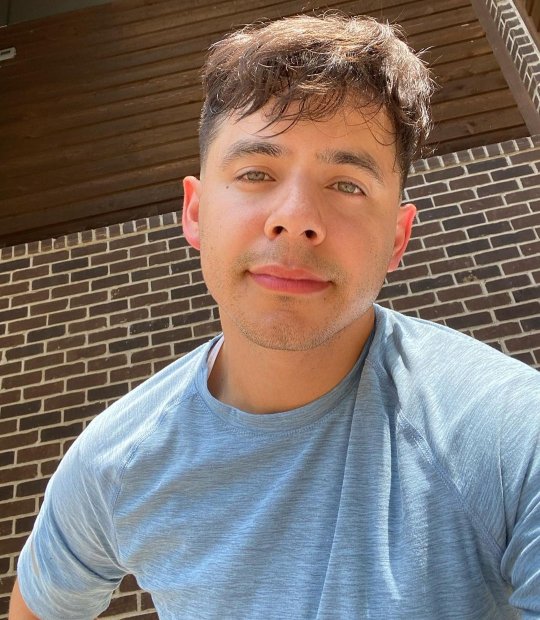

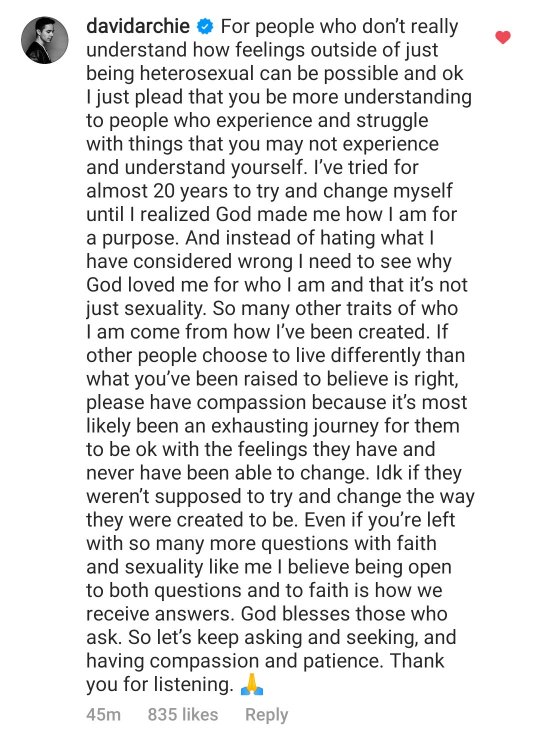
If God hates the gays then how come we got David Archuleta?
Transcript:
davidarchie I like to keep to myself but also thought this was important to share because I know so many other people from religious upbringings feel the same way. I’ve been open to myself and my close family for some years now that I am not sure about my own sexuality. I came out in 2014 as gay to my family. But then I had similar feelings for both genders so maybe a spectrum of bisexual. Then I also have learned I don’t have too much sexual desires and urges as most people 💀which works I guess because I have a commitment to save myself until marriage 🤣. Which people call asexual when they don’t experience sexual urges. There are people experiencing the same feelings of being LGBTQIA+, (i know that’s a lot of letters that a lot of people don’t understand, but there are a lot of unique experiences people feel and live that make them feel isolated and alone that are represented) who are wrestling to follow their beliefs that are so important to them, just as I have. Idk what to make of it and I don’t have all the answers. I just invite you to please consider making room to be more understanding and compassionate to those who are LGBTQIA+, and those who are a part of that community and trying to find that balance with their faith which also is a huge part of their identity like myself. I think we can do better as people of faith and Christians, including Latter-day Saints, to listen more to the wrestle between being LGBTQIA+ and a person of faith. There are more than you may realize going through that wrestle after all the misunderstandings that come with it. I don’t think it should come down to feeling you have to accept one or the other. For me to find peace the reality has been to accept both are real things I experience and make who I am. I’ve yet to figure out what that means but I appreciate you listening to this personal matter. Again I don’t feel comfortable sharing it, but felt I needed to to bring more awareness to people in my same situation and let you know you’re not alone. You can be part of the LGBTQIA+ community and still believe in God and His gospel plan... (continued in comments)
For people who don’t really understand how feelings outside of just being heterosexual can be possible and ok I just plead that you be more understanding to people who experience and struggle with things that you may not experience and understand yourself. I’ve tried for almost 20 years to try and change myself until I realized God made me how I am for a purpose. And instead of hating what I have considered wrong I need to see why God loved me for who I am and that it’s not just sexuality. So many other traits of who I am come from how I’ve been created. If other people choose to live differently than what you’ve been raised to believe is right, please have compassion because it’s most likely been an exhausting journey for them to be ok with the feelings they have and never have been able to change. Idk if they weren’t supposed to try and change the way they were created to be. Even if you’re left with so many more questions with faith and sexuality like me I believe being open to both questions and to faith is how we receive answers. God blesses those who ask. So let’s keep asking and seeking, and having compassion and patience. Thank you for listening. 🙏
553 notes
·
View notes
Text
Dabi’s Missing Heart
So I’ve been seeing two main responses to Dabi’s character as portrayed in BNHA 292, both of which I feel touch on a very surface understanding of his character and role in the story despite seeming like opposite takes.
Take #1:
Dabi is an unfeeling monster created to show the redeemability of Shigaraki and Enji in contrast with his true eeeevil villainy! He will never be redeemed!
Take #2:
Dabi is a sweet softy who did nothing wrong! He will never be redeemed because of this chapter which is so out-of-character!
Note how they both have the same endpoint. I’m not actually gonna address the redemption question much because I can’t fathom what this panel foreshadows if not Touya’s salvation (alive):
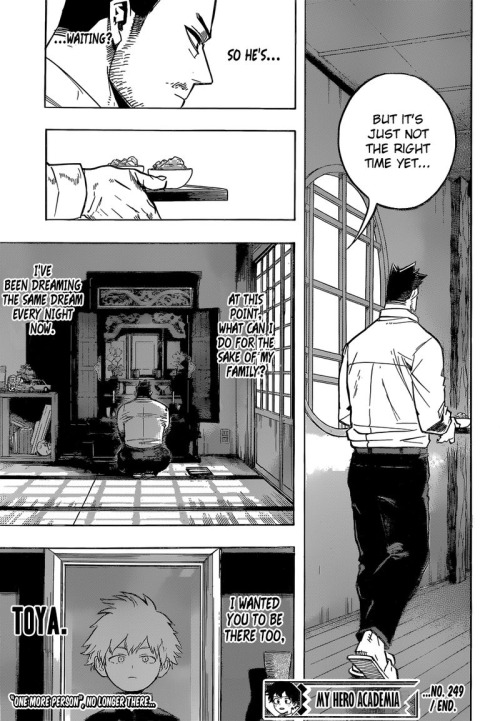
I’m not looking to debate this either; I’m just putting it here because I know it’ll come up if I don’t.
Instead, I wanna address Dabi’s character. He’s my favorite, and I’ve been asked a few different times whether I enjoy him as a villain or as an uwu poor baby, and my answer is always both.
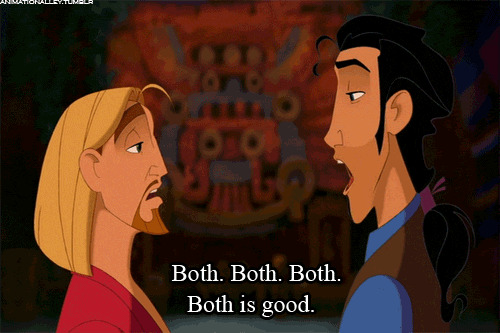
Dabi is a villain. This chapter’s rampage is, in my opinion, not remotely out of character for him. But neither is it the summation of his character, and he surely is not meant to make Enji look good by comparison.
So, who is Dabi?
Dabi is kind of a flaming jerk, and that’s why I like him. He’s an abuse victim who gets to be angry and crass and sharp. He pushes people away because he doesn’t want to open up to them and get burned (heh). He’s just like Shouto in that, except with a dose of murder.
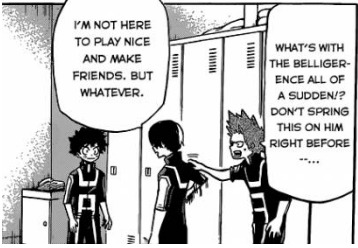
Believe it or not, this is a very realistic response to abuse, and very common too. It’s good to see that representation. If the writing was indeed just “he’s bad get rid of him,” well, that would of course be a terrible representation. But seeing a mean victim get redeemed? Now that’s some good sh*t I’m here for.
If you want a sweethearted, misunderstood soft victim, there is one in MHA, and that’s Shigaraki. Dabi is not these things, but that does not mean he’s not a victim or that he’s somehow an unfeeling monster.
You see, Shigaraki is a heart character. Dabi’s the mind. (Heart and mind characters are a literary pattern that is utilized in literature across the globe; it’s not an eastern/western cultural thing. It has its roots in alchemy.) The problem is that you can’t have a heart without a mind nor a mind without a heart. If you lack one, you’re missing half the picture, and you won’t accomplish anything.
We see this with Shigaraki in his quest to look for ideals, something to believe in, purpose to justify/enable acting on his feelings/emotions.
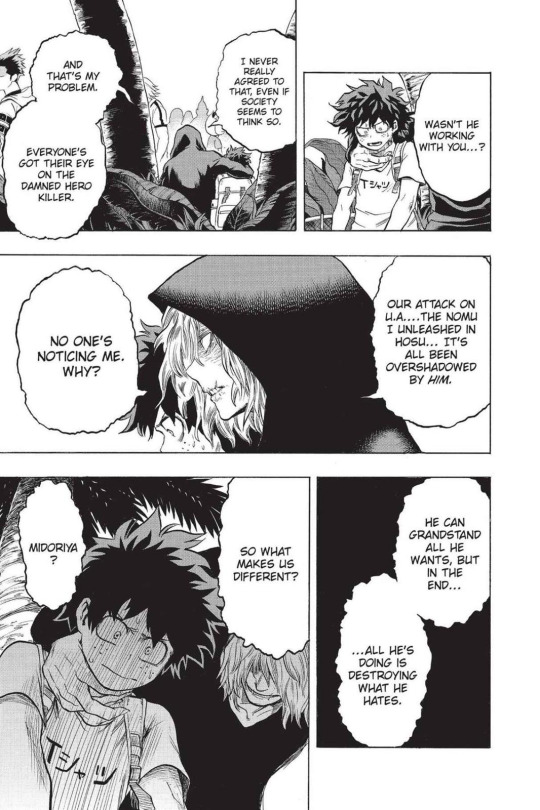

Dabi, in contrast, has conviction and ideals, but eschews any kind of personal connection and care.
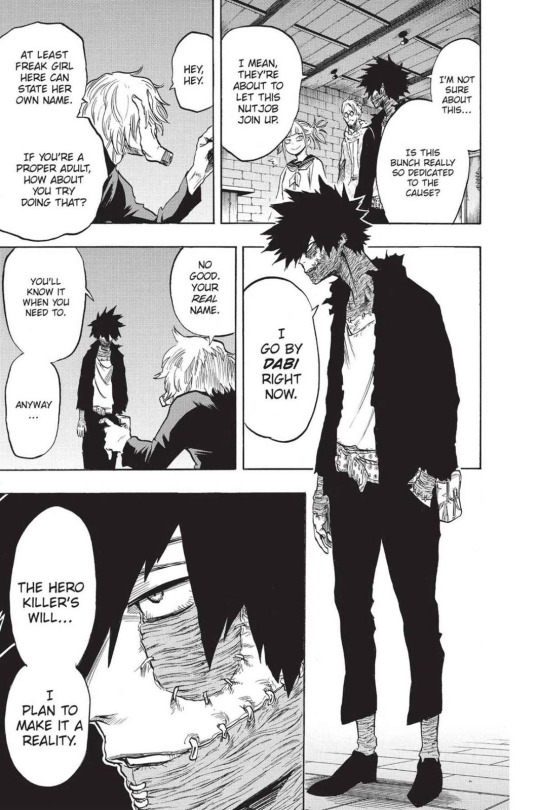
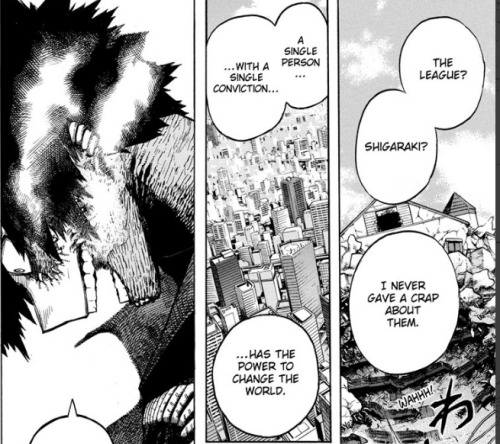
So, both Shigaraki and Dabi struggle to unite heart and mind--but they need to do precisely this.
It’s not a coincidence that Shigaraki expressly envisions both Dabi and Himiko when musing on what his purpose is.
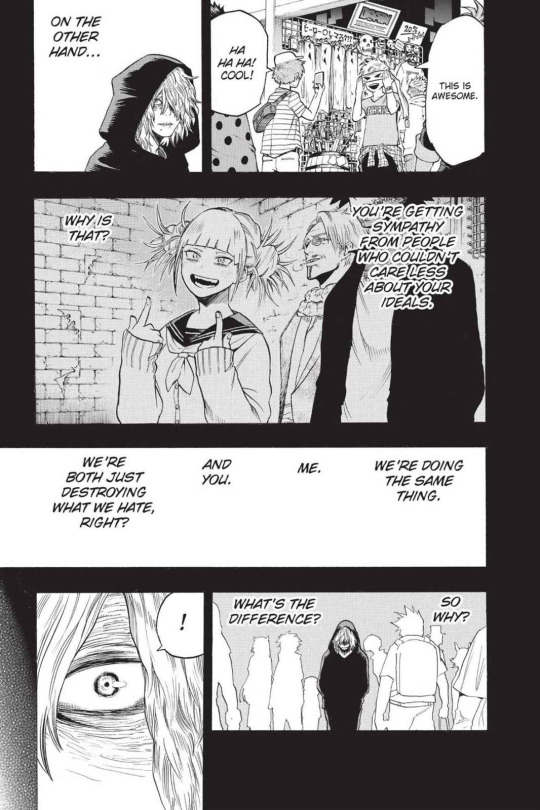
Yet Shigaraki is able to unite more easily with Himiko as opposed to Dabi because Himiko is also a heart character. She claims to be motivated by extreme empathy that warps around to become a lack thereof (wanting to be who she loves).
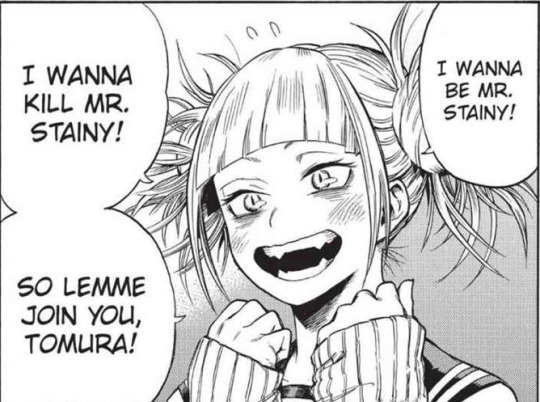
Shigaraki’s motivations are basically revenge for hero society not saving him--which encompasses both a deep internal and external (societal) need for empathy and a need for better ideals. Shigaraki needs Himiko and Dabi. They’re a trio, and all of them need each other to grow. But Himiko, being similarly driven expressly by emotions, is easier for Shigaraki to understand and work with.
The irony is that Dabi is actually a very, very emotional character as well. But what he does (as is typical for a mind character) is repress them, compartmentalize, dissociate. He constantly pushes people away, yet admits privately, to himself, that he’s primarily (and paradoxically) motivated by family. This is emotional, yet Dabi claims he “overthought” and, according to other translations, “snapped” can be actually be read as “went crazy” as a result over overthinking (note: both are mind allusions).
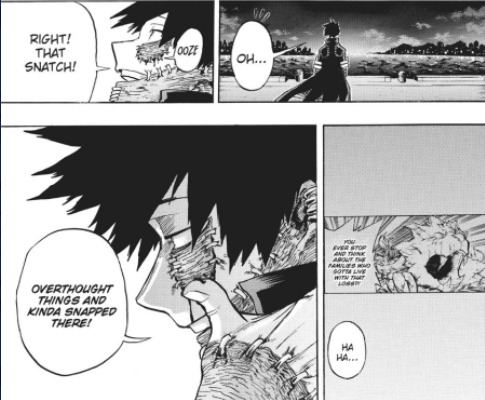
Dabi repressing who he is--Todoroki Touya--is symbolic of him repressing his emotional side, because again, family and emotions are tied together for his character. Now his identity is acknowledged, and Dabi claims to be losing his mind (again), claims that he can’t feel, and yet is completely consumed by emotions. Like, does anyone think he’s being methodical and calculating this chapter?
It’s not just negative emotions (rage, hate) that drive Dabi in response to his family. His seeking belonging and emotional connection is present even in a chapter where he tries to murder two members of his family and laughs off the risk to the life of another.
See, Dabi first asked Shouto to validate his pain:
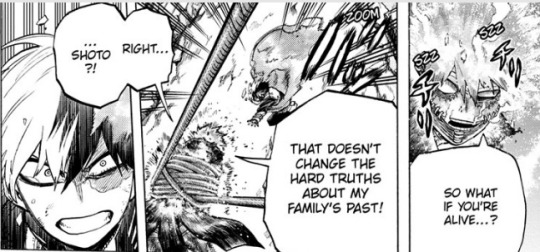
But like, given the circumstances, of course Shouto doesn’t really respond well. How Shouto responds is this:

Shouto’s words are triggering. And keep in mind I am not blaming Shouto: he’s in shock and he’s a kid. I’m merely trying to explain how it likely comes across to Dabi.
You’re crazy. Your feelings don’t matter. You don’t really care about Natsuo! You’re a villain and that’s ALL you are. Not a brother or abuse survivor. Just a villain.
So, uh, yeah, Dabi then retreats back to being unable to feel, dissociating as has always been his coping mechanism. But that’s not all: Dabi’s been repressing for so long that of course he’s gonna go a little insane in response to the dismissal of everything he’s trying to point out. Why wouldn’t he? His family dismissed his pain back then and now again, and so, without that heart, without those emotions, principle is all Dabi has. This has been present since long before Stain’s ideology came into his life:

Now, he answers this question of existence through Stain’s ideology. Purpose is all he has, and to him, Shouto and Best Jeanist are dismissing that too. Why are they dismissing it? Best Jeanist dismisses him for an ideal: the overall good of hero society. Shouto has a mixture of this ideal and also like, genuine shock and pain.
Back to Dabi. Dabi’s summation of himself and his purpose is incorrect and harmful to himself and others. I’m not excusing him or justifying, just explaining. It’s a tragic reflection of what Endeavor raised both Touya and Shouto to be (and thereby ironic that BJ uses an ideal to dismiss him):
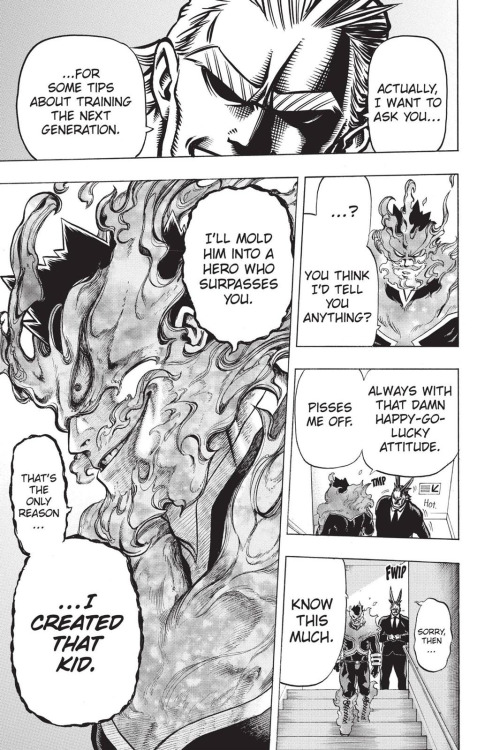
Instead of being raised to be the symbol of hero society--as Endeavor intended--he exists to destroy it. The root is the same: Dabi assumes he exists for hero society, as a tool. He dehumanizes himself, hence why his quirk physically harms him (which also fits his almost religious zeal for Stain’s ideology). But it is not all Dabi is. He’s not a tool, he’s a person, but to acknowledge he’s a person involves acknowledging his heart/emotional desires, and that gets to my next point.
Dabi’s not a reliable narrator about himself. At all. I’ve written about Dabi and dissociation before. So let’s look at Dabi’s devotion to his ideals, the ideals he puts above people and claims he only cares about... because there are moments where Dabi goes against those ideals.
For one example, Dabi’s gone against those ideals when he’s allowed his personal need for revenge (an emotional/heart motivation) to overcome his longterm plan. Like, he was fully about to get himself killed here, even though that would likely mean no one would know the corruption of the Todoroki family and hero society, just for the chance to prove to his father that he hurt him.
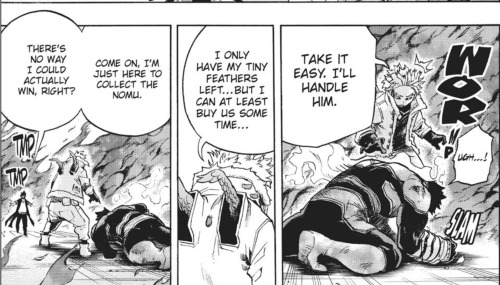

In addition, I’ve talked before about how Dabi’s the only character in the entire damn manga to comment that maybe using child soldiers is not okay. While it’s not explicitly stated, it’s reasonable to conclude that Dabi considers the abuse of children in hero training a sin of hero society that ought to be purged (hence, part of his ideals).
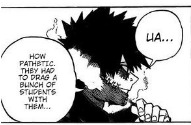
That said, I have also pointed out that Dabi has gone after children in the past when it benefits his mission (Bakugou would like a word). So let’s look at four examples of Dabi and his principles concerning kids--since, after all, he claims to be motivated by heroes who hurt kids.
Firstly, Dabi’s “save the cat” when he spared Aoyama.
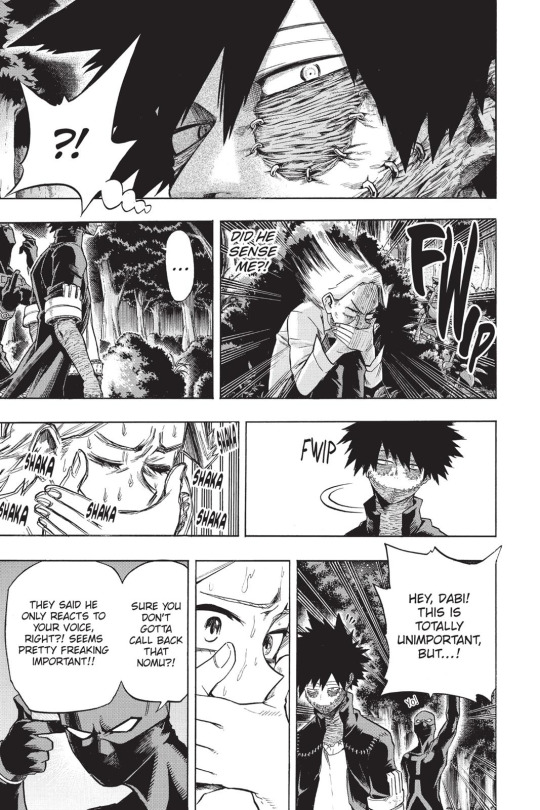
Why did he spare Aoyama? We can only speculate, but it seems quite likely there are two reasons: 1) hurting Aoyama would not add anything to his overall goal of downing hero society, and 2) a terrified, cowering kid might just have been a teeny bit familiar to Dabi. Here, his ideals--destroying hero society--either take a backseat to a reflection of his personal pain (and)/or his ideal of not abusing kids directly contradicted his ideal of bringing down hero society. But the important part is that in this instance, Dabi chose mercy and the goal of bringing down hero society was jeopardized as a result.
So then why did he attack Tokoyami, Nejire, and Shouto this arc? Well, Dabi does things he knows are wrong for the sake of accomplishing his overall purpose. He does things he knows hurt himself for this purpose. This isn’t new. If he can’t be acknowledged, can’t exist as a person with emotions, then he at least will ensure he still has a purpose.
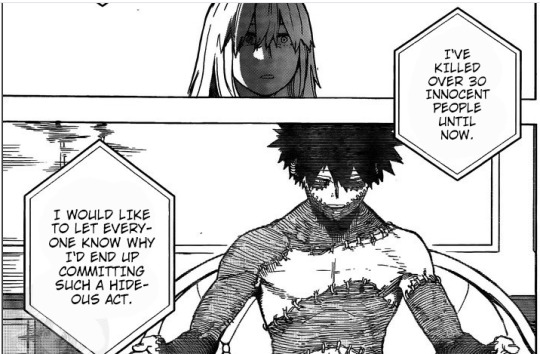
In addition, let’s look at what sets Dabi off in all of these instances. (Again, this isn’t me saying “well actually Dabi’s justified.” He’s not. I’m just pointing to what’s in the text to explain the machinations beyond “bad guy do bad.”)
Dabi tries to reason with Tokoyami, pointing out that Twice was doing essentially what Tokoyami is doing: trying to save his friend(s), but Tokoyami doesn’t listen (also again: not me saying Tokoyami should have listened--realistically, in this situation, it makes sense Tokoyami trusted his mentor!)

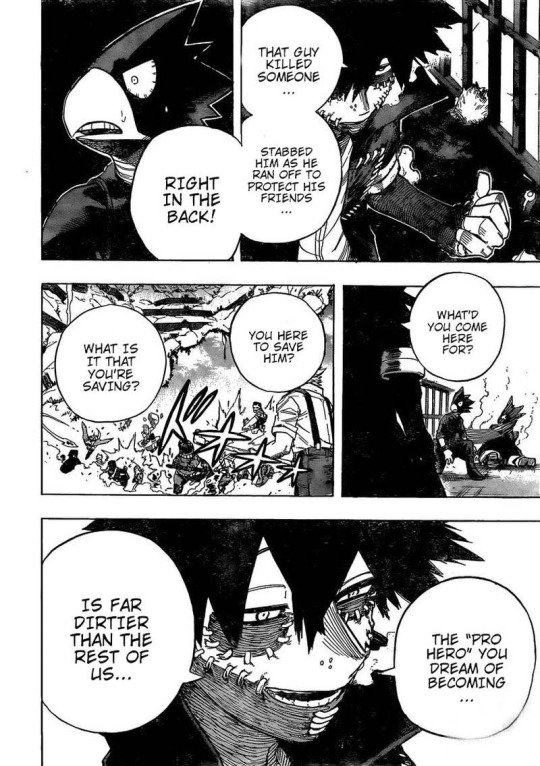
Only after his reasoning was rejected did Dabi go to flames mode. He could have just let Tokoyami save Hawks, but instead he really wanted to kill Hawks and that overrode his other principles. Was this just because of his furthering his goal--killing the #2 hero would help destroy hero society--or because of a sense of personal revenge for Twice? That’s open for interpretation (in my opinion, it’s likely a mixture, because again, it tends to intertwine more than Dabi likes to think it does). His principles and/or emotions are brushed aside, and Dabi Does Not Like That.
Dabi does this again with Shouto this chapter, asking him where he stands on their family issues, and gets brushed aside, and then Shouto goes into his rage mode and Dabi responds. Again, not saying Shouto is rational here or that he should side with Dabi’s murderous plan, but like, his words really don’t come across well to Dabi.

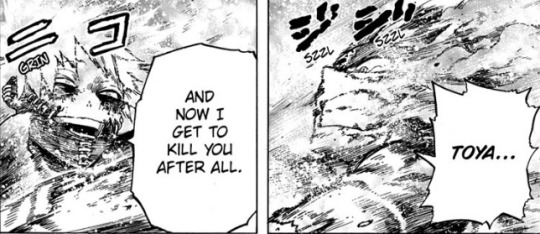
Dabi going after Shouto after explaining things, asking Shouto for help, and then having his pain dismissed is pretty much a repeat of Tokoyami. When Dabi’s pain is dismissed, he says fine, let’s aim for the highest principle possible: making Stain’s will a reality, and damn any emotional ties.
Dabi’s obsession with ideals, you might say, is a smokescreen to cover his own pain. Far from feeling nothing, he feels very deeply. (I promise I’m getting to Nejire.)
So what does this indicate? Well, that Dabi does have a heart and a conscience. But when he lets his heart act, when his heart reaches out, he gets burned. His heart jeopardizes his overall purpose, so he most often dissociates himself from it. But by pretending he doesn’t have a heart, he dehumanizes himself, and he projects that dehumanization onto others (see: seeing Shouto as an extension of Endeavor, when that’s actually the precise image Shouto is trying to shed).
It’s not a coincidence that Shigaraki has been unconscious during the entire confrontation with Endeavor, nor is it a coincidence that Himiko has been MIA. But, Shigaraki wakes up a bit this chapter not only when hearing Dabi spout about how hero society needs to burn, an ideal/the thing Shigaraki lacks, and through a less important but still-ideal-driven character in Spinner asking him to accomplish his supposed ideal of destruction, but when Dabi saves Shigaraki and Spinner.
Dabi doesn’t burn Nejire for lols (not that this makes it better because it doesn’t) or even for ideals. He burns her to save Shigaraki and Spinner, because they are his links to full humanity right now.
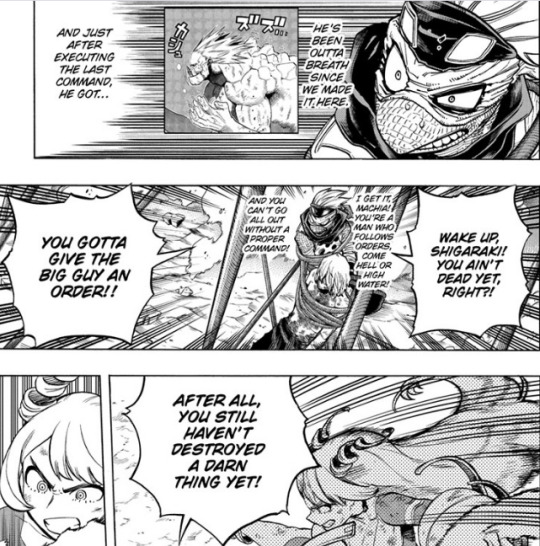
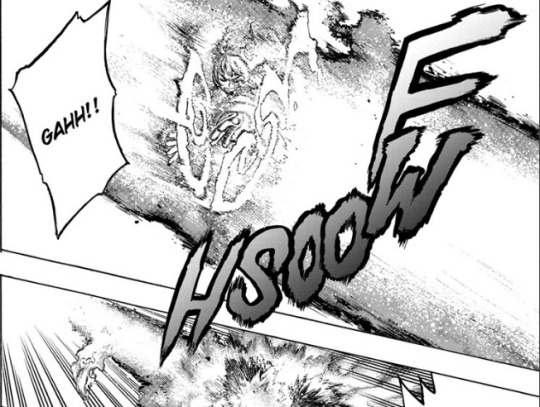
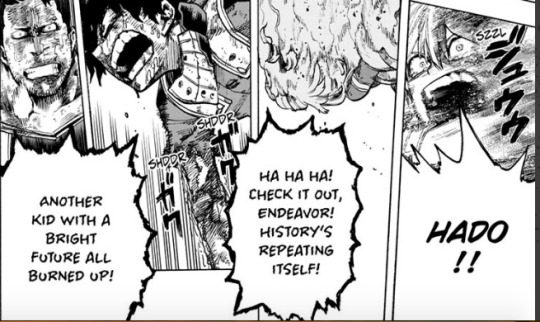
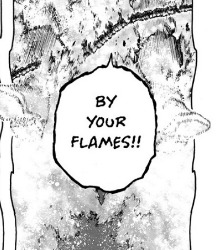
(Again, this is also dissociation and projection: Endeavor did this! No, Dabi, you did. You’re perpetuating violence against kids rather than stopping it.)
But anyways, when Dabi calls upon heart, Shigaraki wakes. He lends Gigantomachia and thereby Dabi and the league power.
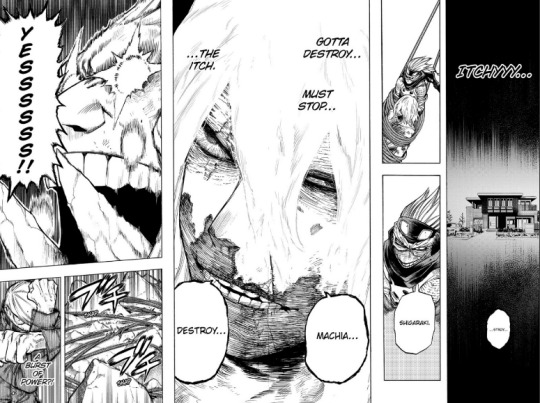
Dabi can only grow and actually accomplish anything related to his ideals (fixing hero society) through accepting a heart--even though that will likely mean some painful surgery to shift his ideals to accommodate said heart, because pure ideals don’t leave much room for humanity. He needs to feel to actually change anything, because right now he’s just making things worse (hence, the need for saving and redemption).
I know the League aren’t the protagonists of the serIes, but their complaints aren’t exactly incorrect either (if anything they’re almost a little too valid). But through growing together, Dabi, Shigaraki, and Himiko might actually be able to accomplish something, and get themselves in a place where they can be reached and saved by Shouto, Deku, and Ochaco. Because to be saved, the kids will have to acknowledge the villains’ pain and complaints, and do something about it.
#bnha 292#bnha meta#mha 292#mha meta#dabi#todoroki shouto#todoroki touya#todoroki enji#hado nejire#toga himiko#shigaraki tomura#shimura tenko#best jeanist#boku no hero academia#my hero academia#bnha theory#mha theory#league of villains#spinner
1K notes
·
View notes
Note
oh man i have a Lot of thoughts about the autopsy of jane doe, both positive and critical For Sure, i'd be SO excited to see your analysis of it! definitely keeping an eye out for that 👀
thanks! i'm working on something article-like to talk about the film and i don't know what i want to do with it yet lol but if i don't post it on here i'll definitely link it. it's mainly a discussion of gender in possession/occult films in the same way that carol clover describes in men, women, and chainsaws - that there are dual plot lines in occult films, usually gendered masculine and feminine respectively, where the "main" feminine plot (the actual possession) is actually a way to explore the "real" masculine plot (the emotional conflict of the "man in crisis" protagonist). typically the man in crisis is too masculine, or "closed" emotionally, where the woman is too "open," which is why she acts as the vehicle for the supernatural occurrence as well as the core emotions of the film. the man has to learn how to become more open (though if he becomes too open, like father karras in the exorcist, he has to die by the end - he has to find a happy medium, where he doesn't actually transgress gender expectations too much. clover calls this state the "new masculine," and we might apply the term "toxic masculinity" to the "closed" emotional state). part of the "opening up" feature of the story is that it allows men to be highly emotionally expressive in situations where they otherwise might not be allowed to, which is cathartic for the assumed primary audience of these films (young men). another feature of the genre is white science vs black magic (once you exhaust the scientific "rational" explanations, you have to accept that something magic is happening). the autopsy of jane doe does this even more than the films she discusses when she published the book in 1992 (the exorcist, poltergeist, christine, etc) because the supernaturally influenced young woman who becomes this kind of vehicle is more of an object than a character. she doesn't have a single line of dialogue or even blink for the entire runtime of the movie. the camerawork often pans to her as if to show her reactions to the events of the movie, which seems kind of pointless because it's the same reaction the whole time (none) but it allows the viewer to project anything they want onto her - from personal suffering to cunning and spite.
compare again to the exorcist: is the story actually about regan mcneil? no. but do we care about her? sure (clover says no, but i think we at least feel for her situation lol). and do we get an idea of what she's like as a person? yes. even though her pain and her body are used narratively as a framework for karras' emotional/religious crisis, we at least see her as a person. both she and her mother are expendable to the "real" plot but they're very active in their roles in the "main" plot - our "jane doe" isn't afforded even that level of agency or identity. so. is that inherently sexist? well, no - if there were other women in the film who were part of the "real" plot, i would say that the presence of women with agency and identity demonstrate enough regard for the personhood of women to make the gender of the subject of the autopsy irrelevant. but there are none. of the three important women in the film, we have 1) an almost corpse, 2) an absent (dead) mother, and 3) a one dimensional girlfriend who is killed off for a man's character development/cathartic expression of emotions. all three are just platforms for the men in crisis of this narrative.
and, to my surprise, much of the reception to the film is to embrace it as a feminist story because the witch is misconstrued as a badass, powerful, Strong Female Character girl boss type for getting revenge on the men who wronged her, with absolutely no consideration given to what the movie actually ends up saying about women. and the director has said that he embraces this interpretation, but never intended it. so like. of course you're going to embrace the interpretation that gives you critical acclaim and the moral high ground. but it's so fucking clear that it was never his intention to say anything about feminism, or women in general, or gender at all. so i find it very frustrating that people read the film that way because it's just. objectively wrong.
there's also things i want to say about this idea that clover talks about in a different chapter of the book when she discusses the country/city divide in a lot of horror (especially rape-revenge films) in which the writer intends the audience to identify with the city characters and be against the country characters (think of, like, house of 1000 corpses - there's pretty explicit socioeconomic regional tension between the evil country residents and the travelers from the city) but first, they have to address the real harm that the City (as a whole) has inflicted upon the Country (usually in the forms of environmental and economic destruction) so in order to justify the antagonization the country people are characterized by, their "retaliation" for these wrongs has to be so extreme and misdirected that we identify with the city people by default (if country men feel victimized by the City and react by attacking a city woman who isn't complicit in the crimes of the City in any of the violent, heinous ways horror movies employ, of course we won't sympathize with them). why am i bringing this up? well, clover says this idea is actually borrowed from the western genre, where native americans are the Villains even as white settlers commit genocide - so they characterize them as extremely savage and violent in order to justify violence against them (in fiction and in real life). the idea is to address the suffering of the Other and delegitimize it through extreme negative characterization (often, with both the people from the country and native americans, through negative stereotyping as well as their actions). so i think that shows how this idea is transferred between different genres and whatever group of people the writers want the viewers to be against, and in this movie it’s happening on the axis of gender instead of race, region, or class. obviously the victims of the salem witch trials suffered extreme injustice and physical violence (especially in the film as victim of the ritual the body clearly underwent) BUT by retaliating for the wrongs done to her, apparently (according to the main characters) at random, she's characterized as monstrous and dangerous and spiteful. her revenge is unjustified because it’s not targeted at the people who actually committed violence against her. they say that the ritual created the very thing it was trying to destroy - i.e. an evil witch. she becomes the thing we're supposed to be afraid of, not someone we’re supposed to sympathize with. she’s othered by this framework, not supported by it, so even if she’s afforded some power through her posthumous magical abilities, we the viewer are not supposed to root for her. if the viewer does sympathize with her, it’s in spite of the writing, not because of it. the main characters who we are intended to identify with feel only shallow sympathy for her, if any - even when they realize they’ve been cutting open a living person, they express shock and revulsion, but not regret. in fact, they go back and scalp her and take out her brain. after realizing that she’s alive! we’re intended to see this as an acceptable retaliation against the witch, not an act of extreme cruelty or at the very least a stupid idea lol.
(also - i hate how much of a buzzword salem is in movies like this lol, nothing about her injuries or the story they “read” on her is even remotely similar to what happened in salem, except for the time period. i know they don’t explicitly say oh yeah, she was definitely from salem, but her injuries really aren’t characteristic of american executions of witches at all so i wish they hadn’t muddied the water by trying to point to an actual historical event. especially since i think the connotation of “witch” and the victims of witch trials has taken on a modern projection of feminism that doesn’t really make sense under any scrutiny. anyway)
not to mention the ending: what was the writer intending the audience to get from the ending? that the cycle of violence continues, and the witch’s revenge will move on and repeat the same violence in the next place, wherever she ends up. we’re supposed to feel bad for whoever her next victims will be. but what about her? i think the movie figures her maybe as triumphant, but she’s going to keep being passed around from morgue to morgue, and she’s going to be vivisected again and again, with no way to communicate her pain or her story. the framework of the story doesn’t allow for this ending to be tragic for her, though - clearly the tragedy lies with the father and son, finally having opened up to one another, unfortunately too late, and dying early, unjust deaths at the hands of this unknowable malignant entity. it doesn’t do justice to her (or the girlfriend, who seems to be nothing but collateral damage in all of this - in the ending sequence, when the police finds the carnage, it only shows them finding the bodies of the men. the girlfriend is as irrelevant to the conclusion as she is to the rest of the plot).
but does this mean the autopsy of jane doe is a “bad” movie? i guess it depends on your perspective. ultimately, it’s one of those questions that i find myself asking when faced with certain kinds of stories that inevitably crop up often in our media: how much can we excuse a story for upholding regressive social norms (even unintentionally) before we have to discount the whole work? i don’t think the autopsy of jane doe warrants complete rejection for being “problematic” but i think the critical acclaim based on the idea that it’s a feminist film should be rejected. i still consider it a very interesting concept with strong acting and a lot of visual appeal, and it’s a very good piece of atmospheric horror. it’s does get a bit boring at certain points, but the core of the film is solid. it’s also not trying to be sexist, arguably it’s not overtly sexist at all, it’s just very very androcentric at the expense of its female characters, and i’m genuinely shocked that anyone would call it feminist. so sure, let’s not throw the baby out with the bath water, but let’s also be critical about how it’s using women as the stage for men’s emotional conflict
also re: my description of this little project as “a film isn’t feminist just because there’s a woman’s name in the title” - i actually don’t want to skim over the fact that “jane doe” isn’t a real name. of the three women in the film, only one has a real name; the other two are referred to by names given to them by men. i’ll conclude on this note because i want to emphasize the lack of even very basic ways of recognizing individual identity afforded to women in this film. so yeah! the end! thanks for your consideration if you read this far!
#the autopsy of jane doe#men women and chainsaws#horror#also to be clear i'm not saying that the exorcist is somehow more feminist because. it's not. i'm just using it as a frame of reference#you'd think a film from 2016 would escape the ways gender is constructed in one from 1973 but that's not really the case#i actually rewatched the end of the movie to make sure that what i said about the girlfriend's body not being found at the end was accurate#and yeah! it is! the intended audience-identified character shifts to the sheriff who - that's right! - is also a man#the camerawork is: shot of the dead son / shot of the sheriff looking sad / shot of the dead father / shot of the sheriff looking sad /#shot of jane doe / shot of the sheriff looking upset angry and suspicious#which is how we're supposed to feel about the conclusion for each character#the girlfriend is notably absent in this sequence#anyway! this is less about me condemning this movie as sexist and more about looking at how women in occult horror#continue to be relegated to secondary plot lines at best or to set dressing for the primary plot line at worst#and what that says about identification of viewers with certain characters and why writers have written the story that way#i think the reception of the film as Feminist might actually point to a shift in identification - but to still be able to enjoy the movie#while identifying with a female character you need to change the narrative that's actually presented to you#hence the rampant impulse to misinterpret the intention of the filmmakers#we do want it to be feminist! the audience doesn't identify with the 'default' anymore automatically#i think that's actually a pretty positive development at least in viewership - if only filmmakers would catch up lol#oh and i only very briefly touched on this here but the white science vs black magic theme is pretty clearly reflected in this film also
84 notes
·
View notes
Note
We sort of started this discussion at Chimeras' Othercon panel, but I wanted to keep it going so I figured I would send an ask. What do you think it would mean for our community to drop the focus on voluntary and involuntary identities? I agree that we fundamentally should, but a bunch of things immediately jump to mind.
Our community has spent years leaning heavily into the lines between voluntary and involuntary identities and taken special care to make massive distinctions between them, leaving little to no room for grey area. It's no bit surprise that alterhuman spaces have had actual, legitimate, longstanding issues of grilling and gatekeeping. Nonhumans with nuanced and complicated identities are forced to shove themselves into a box to fit into the community, and the ideas we have about certain identities needing to be involuntary are absolutely baked into many aspects of our community and its history.
At the same time, we have used this unjustified gatekeeping in part to protect the community from genuine threats and appropriation of our terminology. The way we have limited our concepts of who is allowed to identify in what ways is generally wrong and has no doubt harmed a subset of kin, but at the same time is understandable in the sense that it has a cause. Yes, this was an issue even before KFF, but KFF certainly don't make it easy to create space for genuine voluntary kin and other voluntary alterhumans.
How do we create the space for nuance and fluidity and complexity in these terms and identities after we have spent so long defensively creating rigid boundaries and restrictions regarding the ways people are allowed to identify? How do we address community gatekeeping while also protecting our community from the people who use our identities and terminology in bad faith?
I have a lot of ideas, but this is obviously a very complex topic that we can't just solve in a day. I was just curious to hear your thoughts, if you had any. Hopefully once our personal website is up one of our first essays will be about this issue. (Also, how is Page? /hj)
So I know we’ve been sitting on this ask for... -checks watch- ...almost two weeks now, but it’s genuinely because I just wasn’t sure how to answer it for a good long while, and I didn’t just want to throw out some haphazard, half-hearted answer to such important questions. So here’s our thoughts on the debacle.
Voluntary and involuntary is a focus I doubt we’ll ever see any of the alterhuman communities permanently drop, for several reasons.
The first and foremost being that, by the definition of the term “alterhuman,” defined here as “a subjective identity which is beyond the scope of what is traditionally considered ‘being human’,” both experiences at their most extremes technically fall underneath the label, rendering the distinction (to some) vitally important to helping understand and define their identity/identity labels. The difference between KFF as an alterhuman identity and forms of otherkinity as an alterhuman identity, for instance, as you mention.
And then there’s the societal factors to consider. People like nice, neat little boxes: people like to be able to compartmentalize their communities, with no overlap, with no spillage, with no complications or grey areas or nuance. It’s a fact of life that people often instinctively want to water down labels and identities into more easily digestible formations, though there are arguments around why people precisely do it. And, as you point out, that often means alterhumans and nonhumans with more complex or nuanced identities typically get shoved into one box or another that they may not perfectly fit into.
When we zero in on specifically the otherkin community, this becomes even more complicated given the community’s rife history: abusive p-shifter groups, the appropriation of language by roleplayers and fiction writers, zoophiles attempting to forcibly associate otherkinity with pro-bestiality movements, and the blatant general misinformation spread by laymen and academics alike, just to name a few relevant problems the community has faced and continues to face. The community is stubborn to a fault, largely because it’s had to be in order to survive. It holds to its preconceived notions and rigid boundaries like a dog with toy aggression to their favorite plush stegosaurus. Fittingly so, really.
So how do we take that stubbornness and change it to be more inclusive to our own? How could we, while still surviving all that onslaught and more? That’s the big question.
In regards to the larger alterhuman community, we’re blessed in the fact that it’s still such a young concept: it hasn’t quite yet had to face the “pathological anger” Religious Studies professor Joseph Laycock has described otherkin as bearing the brunt of. It’s still a community figuring itself out, with much of the anger you find related to it aimed at specific subsets of community within it, rather than at alterhumanity as a whole. And I think the fact that the alterhuman community is still metaphorically air-drying on a table means we have the opportunity to prevent anti-nuance and anti-complexity attitudes from taking hold in it. How we do that is another battle in itself-- I feel like the encouragement of inclusive dialogue, of open discussion intermingled with considerate or civil attitudes, within alterhuman-marketed spaces is a good starting point. I also think that the encouragement and legitimization of “alterhuman” as its own standalone term would be a positive force, where it functions as a broad, diverse identity label in addition to being an overarching, joining umbrella label. A label where someone doesn’t have to give details away of their identity if they don’t feel comfortable doing so, or shove themself into a box they may or may not actually feel they fit into. Something functionally similar to how many people use “queer,” if you will.
But that still leaves aside the issue of identity and terminological misuse, I am aware. And that is...an abstract thing to ward against, at absolute best. I think that the defining of our own spaces not only through our words but also through our actions would perhaps be the best thing we could do, realistically. The cultivation of websites, of group projects--books, zines, comics, pictures, forums, anything!--, of community-led conventions and meet-ups and howls and gatherings. Things which foster and build a community identity of sorts is the best defense against those who would try and distort that which makes us, us.
Zooming back in on the otherkin community, these answers change slightly, because--going back to the clay metaphor--the otherkin community has already metaphorically been glazed and baked (in the fires of hell). That history is cemented, the ways people have wronged it and continue to try and wrong it is cemented, the assumptions and attitudes are cemented.
With the otherkin community, I think that the burden of changing minds and pervasive attitudes falls a bit more onto the shoulders of “community leadership,” because of how the community functions and values both community experience and articulation. There’s a reason we don’t have a term comparable to “greymuzzle” in any of the other alterhuman communities, after all-- it’s a well-known and often aggravating quirk of the otherkin community, to hold certain individuals in such high esteem and put them on a pedestal because of their longevity and the things they’ve done and said. I hate to say that they have to set an example, but in the otherkin community that really is one of the best ways to advocate for change, or to push against those gatekeeping and grilling attitudes--by those who are largely well-respected putting forward ideas that have previously been mocked or disavowed, pushing debates on their legitimacy into community consciousness until it eventually trickles into community normalcy and foundation.
(This is, as you can imagine, a double-edged sword depending on how it’s used. But that’s a discussion for another day.)
That’s not to say that the ideas of creation and creativity with the goal of cultivating an inclusive community identity, like I suggested for the alterhuman community, is inapplicable to the otherkin community: but the otherkin community already has a long-term community identity, so it’d moreso be creation and creativity for the sake of formative inclusion. “History is always written by the winners” is a very, very literal phrase in its application to the otherkin community. Our community memory, for lack of a better way to put it, sucks from individual-to-individual. The future of the otherkin community, its eventual-history, is determined by its historians and creators of today: day-to-day arguments and discussions, unless deemed historically relevant by one archivist or another, disappear to the sands of time, and much more long-term recordings such as essays, websites, comics, etc., often go far beyond just its creators hands and get passed around and down for years, potentially. If you want a more nuanced and inclusive community, you have to dig up the clay for it, shovel by shovel, and bake it yourself, brick by brick, and eventually, with luck, or enough backing prestige, or just because those bricks are so astoundingly solid people can’t resist taking some to build their own foundations to nonhumanity, things will change. It will take time above all else, but once it’s there it will be impossible to remove, because people will just assume those bricks have always been there given enough years.
But those are just some of my thoughts and opinions on it. It’s an issue with so many layers of complexity to it, that there’s really no perfect answer out there that I can offer, and I know even what I’ve shared here has its flaws and drawbacks. I’m sure plenty of my followers also have additional thoughts on the subject, and I’d love to hear from other people what they think in the replies and reblogs.
(Also, Page is a very tired boi.)
52 notes
·
View notes
Note
Anyway as someone who was raised catholic and for whom catholicism is actually an important part of my identity (despite no longer considering myself as a part of the faith) this whole enfolding drama is like genuinely pissing me off. One of the only tenants of catholicism that still differentiates itself from other branches of Christian faith is the belief that god's love is not unconditional. One must lead a good life, full of good actions; your belief, your repentance, your ritual observation of mass, means Nothing. Anon hate, can and will send you to hell. Like,,, those are the Rules, thats how it works. Do good to others, and if you don't, suffer torture in purgatory for your sins. Faith is about what You do, not what others do. Additionally.... the Bible is not the Word of God. The Bible is an arrangement of gospels, interpretations of What God Might Want, by disciples. When practicing any faith based upon written word, it is the fundamental duty of practioners to think critically about the text, and how its been translated. Thats why catholics have the opportunity to go to catholic schools, where the discussion and debate of theology is fundamental to overall education. In fact mass is almost always the dissection and critical analysis of an excerpt from the Bible! You all seem to be wrapped around the axel of Thou shalt not worship false idols,, or the idea that the worship of other deities other than the one true God is sin. If you've ever put any time or effort or energy into your faith, you'd have analyzed its historical context and have asked yourself "who benefits from this idea?"or "why might this be mentioned in the Bible? Why is it considered a cardinal sin?" and have thought about the fact that Roman Catholics/Christians became christian because the Roman emperor Constantine forcibly converted the whole of his dominion from their polytheistic paganism. I wonder what incentives the religious scholars translating and assembling religious texts, likely at the behest of Constantine himself, would have for making the worship of other deities a sin! I literally can't stand people who commit bad acts under the guise of God. Guess what! God doesn't care that you did it for him! God will still see you punished for your cruelty. (I'm sorry this is so long I just got so worked up... smh...)who are you to declare blasphemy from behind the hood of cowardice? Who are you lob around christianity and catholicism as if they're hollow gotchas to shame others? Human faith is precious, the study of theology is precious! To demean the sanctity of these universally human things is barbarous. And why? Because a woman minding her own business with her own gods frightens you? You should speak your fears to your own God instead of using them as excuses to harm others... and like I follow this lady!! Shes made of tougher stuff than this! Gnats upon the back of a mountain! But it upsets me that its these petty hurtful people who masquerade as godly folk; that these are the people acting as mouthpieces for their religious communities, when I know that these are not tenants of catholicism. I'm just ugh 😡 cant wait to see yall try and explain this shit to god. Good luck dipshits. (Also yes im on anon because I am not a mountain and these mean people would make me cry)
See, nonnie, you are
1. Correct.
2. A better Christian than so, so many, and more ought to be like you.
339 notes
·
View notes
Text
i said in this post that i have original characters and backstories for neil's extended family. it took me,, a really long time to write it all down. it's been a full month since the original post, and this is still just a run through of things, not full prose, which i might be interested in doing one day but not anytime soon
now, some things to note about what i'm writing, why, and how. methodology, basically. this might not have come through yet in my posts, because i just don't post about my half-finished ideas, but i research a LOT. i like to base what i write about on real life, even if it's just headcanons and fanfic
also, i love helping people with research, so if anyone wants help with research for a fic or just their personal headcanons or anything hit me up!!
as a white person who wants to write characters from different ethnic backgrounds, i feel i have a responsibility to really do my due diligence and research as much as possible to consider things from every angle. and part of that for me is making sure that every character of color has a backstory. they don't just appear somewhere, i have to give them a reason for being there and a story for how they got there, even if that's not what i write their STORY about. people, come from places, basically. i follow a lot of demographic census information and population averages, as well as a lot of history, from as general as transatlantic trade in the last 500 years to as specific as the changes in a single city in a certain year
talking to other writers in the fandom i know i'm a little overzealous, but this is what gives me peace of mind to feel like i am putting the effort in to get things right
so anyway, as for what that means here:
i like writing neil as mixed black/jewish. it works well thematically for his character, as well as just what FEELS right for how i visualize him in my head
only, that can't simply come from nowhere. we know who his parents are. they need to also be poc for neil to be one, and they're a complicated pair to handle in that lens
one choice i made about that, for multiple reasons, is that everything about neil's parents' backgrounds should mirror each other. it can't simply be that one if them is black and one is jewish, or even that mary is both and nathan is white, because that says something i don't want to say any way you slice it. additionally, i want both facets of his ethnicity to be important to neil, and i feel as though he would want to ignore the half of himself from his father.
so: they both have to be mixed, giving them a sort of,, ideological equal footing, as it were. that way, i can also write three different experiences, rather than accidentally implying that This is what being black is, or This is what being jewish is, or This is what being mixed is. and that's also important to me, even if it's just in my head or not even directly addressed. it's still a big consideration of mine anytime i write about any of them
now, finally, onto mary and nathan! i'll put it below a cut because this is already long enough, the under-the-cut is much longer, and i don't want to wear out your thumbs if you don't care
mary hatford
canon timeline, neil was born in 1988. as a tentative number let's say mary was around 30 when he was born, meaning she would be born in the 50s. say her parents were roughly the same age, so they were born around the 20s
like i said, what's happening where in history is very important to me for building these backstories, and major historical events tend to have a lot of influence on population shifts. and well,, jews and europeans in the early-to-mid 20th century? there's no getting around involving world war II. nothing explicit, but it is mentioned and part of the story
mary’s paternal family are the hatfords. they're from the british west indies, largely jamaica, but they've been involved with shipping and trade all over the trans-atlantic region for generations.
they have a complicated relationship with the british empire, having both worked for them and against them at various points, sometimes both at once. similarly, they've tried multiple times through the generations to relocate the family to england permanently, but have been turned away or pressured out
they associate england and the british empire with power, and they both disagree with and desire that power in degrees which vary person to person. they do have a general idea between them though that living in england is a sign of status and authenticity, and while they don't want to leave jamaica permanently they do want their center of power to be in england, and there is a deep resentment against the anglos for not allowing them to stay permanently despite their wealth and influence, the fact that their work will always be looked down on and seen as lesser
i did come into building the hatfords with the primary idea of them being black british, and looking into the organized crime connection second. them being jamaican/west indies is a reference to the jamaican posse, who have a large presence in the london crime scene, although that's really the only connection. the hatfords aren't really yardies in any sense
the hatfords' status as organized crime is a little iffy. mostly they skirt the line between legal and illegal, owning legal trading companies and doing plenty of legal shipping. their main business in the criminal underworld is being middlemen moving supplies for other groups. they have a lot of contacts, and they serve an invaluable role in international smuggling, but they rarely get their own hands dirty. they move things from one place to the other and don't question too much what it is, though they don't deal in people
mary's father is named samuel hatford (first name in reference to samuel bellamy, the gentleman pirate king of the early 18th century). he was born in England, raised largely in Jamaica, then moved back to England as a teenager/young man. he's light-hearted and a bit idealistic for someone from a crime family, seeing the best in people even when they're cold and often believing in principle over profit, which at times put him in conflict with what's best for business
he almost enlisted in world war II, but instead convinced the family to work as weapons and supplies runners supporting the Allies and guerilla resistance groups
mary's mother is named cima ben nahman (ladino/judeo-spanish/sephardic names, doesn't really reference anything or anyone in particular). She's is an algerian jew. Born in algeria (city undecided, though algiers had the largest jewish community at the time), she moved to france for a few years as a young woman, probably for education. she joined anti-fascist organizations which became resistance groups once germany invaded
she's stoic, and has a ruthless mind for strategy. like most algerian jews, she's caught between her home country and its colonizer. the french empire played the algerian muslim majority against the jewish minority as a way to create infighting and distract the algerians from uniting and turning against them, but the algerian jews also then became reliant on the french for protection. (it's a really, really complicated situation)
cima sort of hates them both, both algeria and france. her only allegiance is to being jewish
(contrast this to samuel, who feels that he is BOTH british and caribbean, even when those two identities may be in conflict)
cima and samuel met when samuel provided weapons and supplies to cima's militia group. he took particular interest in them and went out of his way to help, above and beyond the other groups the hatfords were supplying
in the waning period of the war, cima was seriously injured, i'm currently thinking a land mine accident. she survived, but her recovery was slow. she lost an arm and had burns across half her torso, neck, and face. samuel brought her to england supported her through her recovery. in the hospital, they spoke a lot about why they each chose to fight, and the ways they did because neither were formal soldiers fighting for a country. samuel was in many ways fighting for an ideal, while cima was fighting for her people. cima also talked to him a lot about judaism and religion during this time, which samuel took an interest in. eventually, cima decided to stay
they got married. samuel converted, which was somewhat controversial with his family. however, cima agreed to join the family business, where she became an integral but sometimes ruthless member. after algerian independence, she brought some of her trusted family and community into the fold as well, some moving to england and others to france
both cima and samuel believed very heavily in responsibility, though what it meant for each of them was different. cima believed in preparedness and follow-through, samuel believed in family and protection, doing what's right outside of the bounds of the law. this contributed a lot to how they raised their children
when they were born, mary and stuart were raised in england (and i like to think they have an oldest brother). the hatfords were a big family, and influential, although careful about balancing the legal and less-legal sides of their business. the ben nahmans were smaller, and most of them were in france so mary and her brothers saw them less often. they were raised very religiously and culturally jewish, though close with the caribbean side of their family too, as well as being the first generation who were born and raised in england. this put them at a cross-section of three very different cultures, and was where mary first learned about changing and blending in with different groups
mary was the youngest and a little bit spoiled by her father, aunties, and uncles. her mother however was much less tolerant of her. clearly very affected by her time in the war, cima became extremely distrustful and suspicious, and tried to instill in her children a similar sentiment of secrecy and self-sufficiency, avoiding attention and casual relationships. she could be harsh on them, especially mary, who was the most resistant to this
growing up, mary was irresponsible and fun-loving, goading her brothers and cousins, getting in trouble, and starting fights. she didn't understand the tenuous balance of being organized crime, and at times put the whole family at risk by overestimating their sway. her mistakes affected the whole family but it was usually her mother who confronted her about them first and most harshly
she resented her mother's control, and didn't understand the reasons behind it. she also couldn't differentiate between the boundaries her mother sets as a result of her own trauma, and the necessary boundaries she set for the safety of the family, viewing them as one and the same, and leading her to hate any kind of control exerted over her
really, a lot of cima's character is just who mary ends up becoming after being married to nathan and being on the run. i like the story of a child becoming the parent they once hated. rather than learn from her mother, both her failures and her successes, mary becomes her, doomed to make the same mistakes. this is also why cima is wounded by a landmine, because mary dies in fire
---
nathan wesninski
nathan was HARD to come up with a story for, mostly because,,, WHY THE FUCK DOES THIS GUY WORK FOR THE JAPANESE YAKUZA
wesninski is a VERY polish name. the japanese-polish connection is,, not super strong
so anyway, working off the idea of the wesninski family being a polish jewish one, WHERE is he going to meet a japanese crimelord to get into a multi-generation debt/business arrangement with?
turns out, the answer is brazil
brazil actually has a large jewish population (roughly 10th largest in the world). it began with its colonization by the portuguese, but the 19th century to modern population largely comes from central and eastern europe. brazil ALSO has the largest japanese population outside of japan
also this story ended up being WAY more detailed and prosaic than samuel&cima's story, which is basically just bullet points. there's no reason for this i love both stories very much just for some reason the words flowed for me here and not there
to avoid having a second jewish story where wwII is prominent, the wesninskis get a page out of my own family's book: nathan's grandfather (neil's great grandfather) came to the americas fleeing the russian pograms around the turn of the 20th century
so
Wesninski came to brazil (city undecided, have a lot more research to do about individual cities in brazil). he had waardenburg syndrome(a hereditary genetic condition that can affect eyes and hearing) which runs very strongly in his family (his son, nathan, and neil will all inherit it), and he is completely Deaf. while he came to brazil alone, in his new home he connected both with the local jewish community and the local deaf community, and eventually marries another Deaf Jewish woman
eventually they were able to establish a kosher deli and restaurant in the city, one which became a common hangout for the Deaf community. then one day (probably around 1915), a group of japanese men came in, and kept returning
these were the moriyamas, recently arrived from japan, in a place with very few japanese people and businesses. they liked the wesninski deli because they didn't share a language with anyone in there, couldn't even be heard by most of them, and it would also be difficult for the authorities to question them. two layers of protection for a crime family in a vulnerable place
wesninski and the moriyamas were amicable to each other, but as they didn't actually have a way to communicate that was the extent of it. but the moriyamas were polite and payed well and didn't bother the other customers. als, as a jewish establishment, they had a lot of education resources, which were helpful to the moriyamas in learning about brazilian society, including beginning to understand portuguese
now, in japan, the moriyamas were a small yakuza family. they got driven out by their bigger and stronger and more established competition around the time when japanese immigration to brazil was just starting, so that was where they went. though they had little option in where they ended up, they also had little competition in establishing their business
i still have a lot of research to do about the moriyamas. about both how the yakuza operate and about how brazilian organized crime works, and about life in brazil for early japanese immigrants. so a lot of the moriyama details are pretty vague
now the wesninskis had a son, meyer (nathan's father. name in reference to meyer lansky, famous american jewish mobster of polish descent) who was around 14 when the moriyamas arrived. he himself was not fully deaf like his parents, though was hard of hearing and raised in the Deaf community. as he goes through his rebellious teenage years, well, the gangsters are right there
in the early days the moriyamas were still more concerned with mostly the japanese enclaves, but they had aspirations of expanding. meyer wasn't japanese, but he was helpful to the moriyamas who came into the deli to study. he was perceptive and bold, could keep a secret, knew his way around knives from working in the deli, and knew the city. he was a good asset to them, and he was interested in causing some trouble
over the next ten years or so, meyer got increasingly more involved, alongside the moriyamas becoming increasingly more established throughout the city. he goes from someone who helps out occasionally and relays information beyween parties to getting involved with minor shakedowns, bribery, evidence disposal. by the time he's in his 20s he's thoroughly enmeshed
his parents were older when they had him, and his father died relatively young, leaving meyer the store and his mother to take care of. they were vaguely aware of his connections to the moriyamas and didn't approve of what he did with them but he also kept the worst from them, and was always a diligent son, and the only one they had. he assured them no matter how far he went that he wasn't "really" part of the gang
"yakuza have tattoos, and see, ima? no tattoos. i'm still a good jewish son, not a gangster"
now the problem arises when meyer falls for camara da machado, a young Deaf woman who frequents the store
(based on/inspired by/FC yaya dacosta (where the name comes from) and rutina wesley)
she was a Deaf girl born to a hearing family who struggled to give her the support she needed, maybe even just a single mother, and she'd spent a lot of time alone at the deli from a young age (12-ish?). she was shy and quiet and a little bit of a shrinking violet, but the wesninskis became very fond of her. she started tentatively helping them out around the store which became a job. she was often included in family meals and holidays, and always had a bed in their apartment above the deli if she needed one, and more than once had helped patch meyer up after he got in trouble to hide the extent of it from his parents
she was a couple years younger than him but he'd always been sweet on her. and she'd had a crush on him from basically the moment she'd layed eyes on him. they'd known each for years and camara was basically family, and then one day when they were both in their 20s it just suddenly clicked for them
so meyer and camara fell in love. meyer was head of the house, had to keep the deli running, and had his mother, camara, and possibly camara's mother (undecided at this juncture) to worry about and he decided he didn't want to continue working with the moriyamas in case it dragged his family into danger. being a gangster was a fling of youth and he was ready to grow up
when he informed the moriyamas of this though, they,,, did not agree.
while MEYER might not have considered himself part of the gang, THEY didn't think he just got to walk away. he'd worked with them for too long and knew too much. there might even have been a desire to tie him to the family permanently through marriage. and well,, one man against a growing criminal empire can't do much
it was a huge shock to him, and made him truly realize how naive and reckless he'd been. he'd been a dumb kid who wanted to start some trouble, the moriyamas were career criminals. they expected that once you were in, you were in for life, and they did not take kindly to meyer disagreeing with this
he didn't know how to explain this to his family... so he didn't. they'd all told him they wanted him to stop, but he'd meant for the announcement to be a surprise. after learning that he would not be permitted to walk away, he chose to just hide it and continue with business as usual
it worked for a while, maybe a few years, a time during which the moriyamas were getting a lot more brutal as they got more established and increasingly looked to expand, putting them in competition with other gangs and greater law enforcement, until they were a true crime empire spread across whole regions of the country. meyer had lost a lot of esteem in their eyes by asking to leave, leading them to put him under increasing scrutiny and giving him more incriminating tasks, to ensure that he would be incriminated if he ever tried to turn them in. it's during this time that he first had to kill for them
then camara got pregnant
and meyer was terrified. he didn't know how the moriyamas would deal with a kid. the only marriages and children he knew of within the family were endorsed by the boss, many arranged by him, and he knew his wouldn't be approved. yakuza wives were heavily involved with the business too, and he absolutely did not want that for camara
he broke down and told her everything. she's horrified, and furious that he kept it from her, but she didn't want to give up her baby. it would be hard, but she believed they can keep it hidden, and if the moriyamas found out, maybe it wouln't be so bad?
(spoiler: it would)
they have a son, born natan da machado, under his mother's name
meyer and camara never got married. meyer was going to propose after he left the moriyamas but that obviously didn't happen. marriages were supposed to be blessed by the boss, and meyer never dared to ask. they already lived together, anyway
but with natan, they decided that meyer couldn't acknowledge him as his own. in the deli or in the streets, he didn't acknowledge natan. he was camara's bastard son, and meyer didn't want anything to do with him
it was a flimsy disguise at best. natan was mixed, but there was a strong enough resemblance to his father. even if his hair was a darker red or he had brown skin, they had the same eyes
they tried to keep him away from the moriyamas as he grew up, hoping they wouldn't see him and make the connection, but they also kept him very hidden in general, just in case. he spent a lot of time inside, with his grandmothers
and that was how natan grew up, feeling like a secret, his father cold and distant, only acknowledging him in their apartment. cut off from other kids his age. a hearing boy in a Deaf family (natan himself was HoH but still had most of his hearing. meyer and his maternal grandmother could both hear, but they had gotten out of the habit of it and mostly communicated through sign)
natan developed a deep feeling of resentment towards his father and shame about himself from a young age. he felt like a mistake, defective somehow. so wrong he had to be hidden away from everyone
there's only so long that you can hide a child, though, and when natan was around ten the moriyamas found out about him, and they were not happy.
they didn't like split attention or loyalty. they kept children and family under very tight wraps. they should be one hundred percent enmeshed in the moriyama empire, raised to be loyal and helpful in whatever way they were needed. the fact that meyer wanted and was willing to leave for this family, and then hid his son, was a huge betrayal
still, they gave him an opportunity to prove his loyalty: kill camara or the moriyamas would kill them all: her, natan, meyer, and both their mothers
but meyer couldn't do it, and instead he told camara to run and hope they didn't actually care enough to chase her down. and she did. and she couldn't take natan with her. (i haven't fully fleshed out why yet, currently thinking that meyer was given this ultimatium when they already had natan)
so camara left her son, and got away
i built the story of mary's mother as a reflection of mary's story if something had been different, and i built nathan's story the same way. his wife takes her son and runs away with him when the moriyamas try to take him from her. nathan's mother was in the same situation and left him behind
over the next forty years of his belonging to the moriyamas he gets to marinate in that resentment. from the father that ignored to the mother who ran away from him, he internalizes it as being something wrong with him, not the circumstances. the more he's taught to torture and kill and the more he excels at it, the more this belief gets cemented. he's good at killing, he was meant to kill. he's twisted and broken and wrong inside and he always was and his parents always knew
and then when it happens again but differently this time he throws away a decade and millions of dollars and his standing with his boss to hunt down his son and his wife because he didn't get to run away so why should they? why does mary love nathaniel more than camara loved natan?
from here, the exact detail's of nathan's story aren't quite solidified. whether he was raised by his father from then on or by his grandmothers (or whether his grandmothers left with his mother) or whether the moriyamas put him somewhere else entirely, but from then on he lived under the moriyamas' direct supervision, and they taught him how to turn a knife on a man
they took his mother's name from him, though, so he's natan wesninski, not natan da machado, because they own the wesninskis now
and when the moriyamas decided to expand beyond brazil when natan was a young man instead of a child, and settled on the east coast of the US, they renamed him nathan, because it sounded more "american"
---
so that's it. obviously there are still a lot of unfinished details in both stories, but they're strong enough at this point to stand on their own and i haven't changed or rethought a lot of the major details in a long time
i've become extremely attached to these OCs and their stories, and i hope they interest other people too. some day i'd like to write them out in prose properly, along with the story of nathan and mary meeting, but that'll be a while away considering the pace i move at
so until then i just wanted to put this out there
#aftg#tfc#neil josten#nathaniel wesninski#mary hatford#nathan wesninski#txt#my fics#my writing#my posts#black neil josten#jewish neil josten#cw gangs#cw organized crime#cw ww11#cw wwII#long form post
89 notes
·
View notes
Text
a space between the shadows
My VERY last-minute prompt fill for @wayhavensummer, which turned into YET ANOTHER character study of my Sad Werewolf Detective~
Prompt: 🌈First Pride, Belonging
Pairing: Adam/Male Detective, Bonus Found Family Vibes~
Words: 2137
Summary: Arlo has some... complex feelings around his identity, his relationship with his closest friend, and who he is supposed to be in a place like Wayhaven.
CW for allusions to homophobia, slurs, and implications of religious trauma/bigotry
Seeing as someone actually bothered to submit paperwork this time, Arlo feels it’s safe to assume there will be no (or at least fewer) strange supernatural occurrences involved in this festival. Still, he’s not sure what to make of it.
“I don’t… have to go, do I?” he asks Tina.
Tina blinks slowly at him, as if he’s suddenly become the stupidest creature to ever draw breath. “Yes,” she says simply.
“I’m just a detective, and it’s Wayhaven, it won’t be anything crazy, so I don’t have to be there to keep things—”
“Oh, no, of course not,” she interjects, well acquainted with his nervous babbling by now. He’s barely exhaled his relieved sigh when she leans her elbows on his desk and grins in his face. “We’re going in a purely civilian capacity.”
“But I don’t want to,” he says quietly, and he knows he sounds like a pouty little kid, but he can’t help it.
Tina pouts mockingly right back at him. “I don’t care.”
And that sort of sums up their entire relationship, he thinks.
Adam, of course, is about as pleased as Arlo is. Unfortunately, Adam has not yet learned what Arlo knew by sixteen— that there is no force in the known universe more powerful than Tina Poname's stubbornness. She simply can't be defeated.
"She's a little bisexual juggernaut," Arlo sighs. He's annoyed, sure, but he can't keep the fondness from his tone as he watches her swan back and forth from the safety of the sitting room.
Naturally, Tina and Felix get on like a house on fire, and the two of them have commandeered Arlo's studio. The floor is a minefield of water cups, washable paint, and drying posters. Felix has Tina's flag tied around his neck like a cape.
Mason disappeared the second the first tube of paint was popped open, though his sharpy retort of "I like what I like" when Tina asked what his persuasion was (so that she could make him a poster as well) did launch her into her practiced dissertation on the intricacies of bi and pan identities, and how they mean similar things, how at their core neither are meant to be exclusive, and it is simply a matter of personal identity and choice which one suits an individual best.
"Have you been to a Pride festival before?" Nate asks, setting down two mugs of tea on Arlo's coffee table, carefully out of the way of the map of Wayhaven he and Adam are poring over. More for Adam's peace of mind than anything. It's mostly taking place in the local park, and while there will be a parade, the route is short enough to keep things contained.
"Yeah, once," Arlo says with a shrug, and he and Adam are sitting close enough on the sofa for their shoulders to brush with the motion. "When I was at uni."
Nate hums and sits down in the armchair across from them. "I assume it was… unpleasant for you?"
Arlo smiles, flustered, and rubs at the back of his neck. "It was fine. Fun, even. I mean, I went to art school, so the turnout was great. Nerve-wracking, yeah, because so many people, but seeing your anthropology professor riding a mechanical bull in little more than nipple pasties is one hell of a distraction."
He can feel the scandalized look Adam is giving him, but he knows if he turns to meet his eyes, he'll blush all the way to his hairline, so he sips deeply from his mug instead.
Nate tilts his head, lips pursed. There's a brief twitch of amusement to them, but it settles as his brow furrows thoughtfully. "I'm afraid I don't understand. If you had a good time at the last festival you attended, why are you so hesitant to participate in one closer to home?"
Arlo looks down at his mug, thumbing at a chip in the black enamel, exposing an ellipse of white ceramic underneath. The silence is heavy, and he knows if he lets it go on too long, Nate's going to start apologizing, so he sighs hard through his nose before he barrels on. "It's… it's different here. Back at school, I wasn't… I wasn't the Detective's weird brat. I was just Priestley, the weird performing arts major." He picks a little harder at his mug. "Might sound odd, but I didn't have to perform there, not the way I do here. I could just be Arlo. Not a shadow. Just… the fuckoff huge goth from your sociology lecture hall who just so happens to like men."
He doesn't look up, but he can tell Nate is chewing over the information. As he considers, Adam shifts on the sofa, closing the bare inch of space between them so their thighs press together. Arlo peeks up, and Adam's giving him that look. The one that makes him go all soft around the edges. "I know small towns can be… conservative," he begins, and his mouth twists distastefully around the word. "But I have never gotten the impression that Wayhaven was…"
"Anything but refreshingly progressive," Nate finishes for him.
Arlo looks up with a wry smile. "Yeah, no, it's great on that front. I'm damned lucky I didn't have to grow up with Rebecca's family. It's just…" He shifts his weight, and before he can sprout claws to really start menacing his poor mug, Adam plucks it from his hands and sets it out of the way. "There's a legacy for me here," he murmurs. "One I never asked for. Sure, I don't have to worry about getting called slurs," he chews his lip, "at least, not anymore after the whole Graham thing, but I'm still… I don't really get to be me here. People here don't look at me and see Arlo. They see Rook's kid. They see Detective Priestley the Second." He huffs out a laugh. "I didn't even get to come out on my own here. I honestly don't think I ever have outside of school. Everyone knows everything they want to know about me, because I've been a landmark since I was born. This month, it's just a landmark with a rainbow flag."
Nate is giving him that sad-eyed look he gets whenever Arlo and Rebecca get into it. The one that says he wants to help, but he's not sure how.
Arlo rubs his hands over the worn denim of his dark jeans, picking at a frayed thread. There’s a spiderweb of cracks forming in the fresh coat of black polish on his thumb where the nail has begun to thicken in response to his emotional state. He sighs a little, but he doesn’t have the time to sink too deeply into his own head, because there is a pale hand creeping cautiously over his.
“Why do it, then?” Adam asks, head tilted and brows drawn, as if he truly doesn’t understand. “Officer Poname cares deeply for you. I am sure she would understand if you were honest with her.” His lips twitch faintly, and the smile he gives Arlo is touching in its earnest, if stilted, effort. “Bisexual juggernaut or no. Though, she is only little to you.”
Arlo snickers weakly, turning his face away so he can hide behind the fall of his hair. Adam doesn’t let him hide, though, brushing it out of his face, knuckles skimming the detective’s cheekbone. Arlo can’t help but sigh and lean into the touch, eyes fluttering closed.
There’s a crash and a cry from the other room, but it’s Nate’s startled noise that makes the two of them leap apart as if burned, putting a few inches of space between them.
Arlo’s face flushes hotly when Nate smiles at them, and there’s a mischievous twinkle to his dark eyes. “I wonder what that’s about!” he exclaims, clapping his hands together and springing to his feet. “I’ll go check on them, shall I? Make sure they’re not causing too much trouble.” And before Arlo can even stutter out a… something—an explanation, or maybe an apology for third-wheeling the poor man—Nate is striding off towards the studio with a spring in his step the detective can’t help but find incredibly mocking.
He closes the door behind him with a parting smile and a decisive click.
They’re left on the sofa sitting guiltily apart like a pair of teenagers caught canoodling, and surprisingly it’s Adam who breaks the stalemate by huffing through his nose and turning to Arlo again, reaching out for his hand and tugging it between his own. “You were saying?” he presses gently, his thumb tracing ticklish lines alone Arlo’s palm.
Arlo tilts his head and sighs “I guess I just… Tina’s like my sister, you know? And we wound up going to different universities in different cities, and I didn’t really get to share any of those big milestones with her. She’s not the type to be jealous I made other friends or went and had fun without her, but it feels sort of… I want to be able to share this with her, since she was one of the first people who ever bothered to… to not just care about me, but to care about me enough to…” He furrows his brow and chews at his lip, trying to figure out how to make sense of the feelings he’s never really been able to express out loud. “Neither of us belonged here, really. Sure, I was born here, but I never really felt like I was supposed to be here. I just felt like I was filling a space someone more important than me left vacant.”
He looks down at Adam’s hands, sturdy and strong, tangled up around his freckled, long-fingered one. He swallows. “Tina’s the one who looked at that space, then decided it wasn’t for either of us, and she carved out one that was.” He smiles fondly, thinking of the way Tina bullied her way into his lonely life and gave it some much-needed color. “She made a space where we could both fit. It was messy, and awkward, and we were still outcasts, but we were outcasts together.” He laughs, and it sounds suspiciously wet even to his own ears. Thankfully, Adam doesn’t bring attention to it. “Christ, I’m rambling. Does this make any sense at all?”
Adam is quiet, thoughtful for a moment, but he squeezes Arlo’s fingers to draw his eyes up again. He’s smiling, a real smile, one that Arlo is seeing more and more these days. A man could get addicted to a smile like that. “It does,” he murmurs, bringing Arlo’s hand to his mouth to brush a kiss to his palm. It’s such a simple little touch, it barely lasts a second, but it steals all the air from Arlo’s lungs.
Adam shifts, and his face scrunches a bit. “While I won’t say I am looking forward to the chaos, I am…” He looks up at Arlo again, his brows drawn, his jaw set with the same fierce determination with which he stares down trappers. “I am honored to share this with you.”
It is really not fair, the way he can just say things like that, things that would sound trite and cheesy coming from anyone else, with such naked honesty. Arlo has no choice but to kiss him. He’s rewarded by a sweet, startled noise rumbling against his mouth, but he draws back before they can get too distracted, seeing as their friends are just a room away.
If Adam is pouting, Arlo’s certainly not going to be the one to tell him.
“I guess, in a way, it’s a first for the both of us, right?” he coughs, just to ease the heavy atmosphere a bit. “My first Pride in Wayhaven, and your first entirely.” He pokes Adam in the chest. “We’ll have to get you a flag. You look good in pastels.”
“Are you certain the rainbow is not too at odds with your aesthetic?” Adam teases in return.
“Goth is a state of mind,” Arlo replies archly.
They laugh quietly together, shifting again to close the distance between them. Adam turns to face Arlo more fully, their shoulders bumping in a way that is incredibly comforting in its charming awkwardness. “What is wrong with Agent Priestley’s family?” he asks, keeping his voice low so as not to draw the attention of their companions chattering in the other room.
Arlo tries to smile, but it comes off as more of a tense grimace. “Catholic,” he snorts.
Adam’s expression mirrors his so perfectly, Arlo has to clap a hand over his mouth so he doesn’t bark out a laugh. “Ah,” the vampire says primly. “I understand.”
Arlo gives up and collapses against the vampire, snickering helplessly into his neck.
#the wayhaven chronicles#wayhavensummer#adam du mortain#a du mortain#tina poname#i hope this makes any sort of sense#i know i kinda went off the wall w the prompt#but my logic is that there's ANOTHER prompt that will be for the actual festival#so this is more an introduction to the First Pride????#fhdkjashdkjsg if its bad its bad okay#yeehaw#oc: arlo priestley#arlo's issues aren't with his identity so much as with the fact that his identity never really mattered to people in wayhaven#just who his parents are#arlo wants to be allowed to be himself without feeling like he has to live up to someone else first#and tina helped him with that#tina is the one who helped him feel pride#so he wants to be able to share this with her#its not directly mentioned here but naturally adam is trans yeehaw#pidge writes
56 notes
·
View notes
Text
Paganism and witchcraft
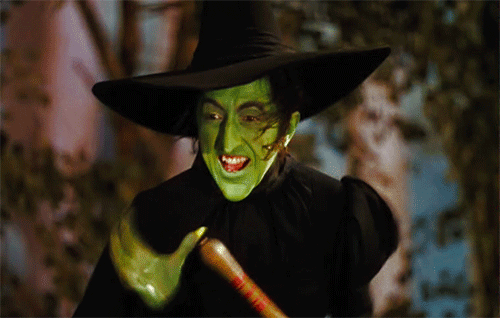
Thanks to many, many centuries of misinformation, paganism and magic are inextricably linked in pop culture. Progress has been made — the word “pagan” is less likely to make people think of dark rites, blood magic, and ritual orgies in the twenty-first century than it was in, say, the seventeenth century. Even so, if you tell someone you identify as pagan, you’re bound to eventually get the question: “So, are you, like, a witch?”
The answer, like so many things in paganism is that it depends on the pagan.
Before we get into modern pagans and their views on magic, I think it’s helpful to understand the historical roots of the association of paganism with witchcraft. And for that, we have to travel back to the Middle Ages, when Christianity was already well-established as the dominant religion in Europe, and the Catholic Church was well on its way to becoming a hegemonic superpower. The beginning of the witch hunts was just around the corner.
In her book The Study of Witchcraft, Deborah Lipp claims that two very different understandings of what it meant to be a witch were both at work in the medieval witch trials.
The first concept of witchcraft, which Lipp identifies as the “folk witch,” was much older and much less Christian. These were people who used dark magic, such as hexes, to cause harm and mischief. Though they may not have been called “witches,” folk witches or witch-like figures have existed in virtually every culture in some form. Examples include British witches, Irish changelings, and Navajo skin-walkers. The one consistent feature of these diverse creatures is an association with magic and a tendency to cause harm. They were seen as a threat to the community, and these types of witches were persecuted long before the rise of Christianity.
(For what it’s worth, the fact that witches were disliked by ancient pagans doesn’t mean that all magic was. Most of the ancient cultures that inspired modern paganism also had their own magical practice, and in many cases magic does not seem to have been controversial or taboo. But again, those who used magic for good would not have been considered witches before the twentieth century.)
The second concept of witchcraft identified by Lipp is the “Satanic witch,” which is an exclusively Christian concept. These people were heretics of the worst kind, members of a cult of Satan worshipers who had sexual relations with demons and plotted against the Church. They were a threat to the faithful Christians in their community.
The only unifying factor in these definitions is a sense of deviancy. Both folk witches and Satanic witches were people who deviated from the norm. It’s no coincidence that those accused of witchcraft were often those who broke societal norms in some way, such as single mothers or women who owned property.
These two distinct definitions of witchcraft would collide in the Middle Ages, with those who were tried for witchcraft often accused both of causing harm to the community by blighting crops or killing animals, and of worshiping Satan. It was commonly believed that these witches tormented the community with evil powers given to them by Satan.
But what does all this have to do with paganism?
While it’s possible that some of the people executed for witchcraft in Europe were secretly practicing the old pagan religions, they definitely wouldn’t have been the majority or even a significant minority. Supposed witches were almost always accused of worshiping Satan, not pagan gods. Most of the people who were accused, tried, and executed for witchcraft were probably accused for social reasons, not religious ones. Most if not all of them were probably not witches as we would recognize them today.
The accusation of devil worship is one that medieval “witches” have in common with pagans. Many of Satan’s names were originally the names of pagan deities, such as Beelzebub (a Philistine god), Moloch (a Canaanite god), and Dagon (another Philistine god). This association of Satan with pagan deities reflects real-world political conflict between the Hebrew people (and later the early Christians) and the cultures who worshiped those deities. Like the label of “witch,” this serves a political function and creates a clear “us vs. them” mindset.
However, it wouldn’t be accurate to say that medieval Christians thought that witch = pagan, or that they thought pagan = devil worship. During the conversion period (several hundred years before the Middle Ages), it seems that Christians largely viewed pagan gods as just that — other gods who were in competition with their own. There are records of Christians and pagans living in relative peace in some parts of Europe — something that surely wouldn’t have been possible if Christians believed that all pagans were devil worshipers.
Fear and paranoia regarding Satan and his followers didn’t become a large part of Christianity until the Middle Ages. Before that, Satan was a relatively minor figure, less the embodiment of evil and more of an annoyance. He was even used for comic relief in religious plays! It was in the Middle Ages that Satan began to take on a more prolific, antagonistic role. Again, this coincided with the Church becoming a hegemonic political entity.
I’m by no means an expert on European history, but it sure seems to me like the witch hunts and Satan paranoia of the Middle Ages were more about controlling the people and punishing deviance than about genuine religious conviction. Just saying.
By the time the witch hunts began, paganism (a.k.a., pre-Christian religion) had all but died out in Europe. Worship of the old gods had either ceased entirely or had been incorporated into Christianity in the form of regional tradition and superstition. Thus, “witches” were accused of worshiping Satan who, at the time, would have been a much more recognizable figure than Jupiter or Anubis.
So, to make a very long story short, there really isn’t a historical connection between paganism and witchcraft, except for both of them having been in conflict with Christianity at some point. It’s important to remember that witchcraft (in this case defined as harmful magic) is a concept that predates Christianity and that witches were treated with suspicion in pagan as well as Christian communities.
That’s not to say the two aren’t connected. In fact, modern paganism is much more closely linked to witchcraft than its historic counterparts.
If you read enough older books about paganism, especially Wicca and other neopagan religions, you will likely find references to “the Burning Times.” This is an exaggerated, largely fictionalized, and thoroughly disproved narrative that was popular with early neopagans, including Gerald Gardner, the father of Wicca. The “Burning Times” refers to the idea that, in the Middle Ages in Europe, the witch hunts were a genocidal attack on self-identified witches and pagans, in an attempt to wipe out these ancient belief systems. This is almost entirely false.
Belief in the “Burning Times” requires belief in Margaret Murray’s witch-cult hypothesis, which has been almost totally discredited by historians and archaeologists. Murray believed that the medieval witch trials were an attempt to wipe out a widespread pagan religion that had survived the Christianization of Europe. Murray claimed that this witch cult spanned much of Europe and worshiped a horned deity, who was referred to as the Devil by Christians.
Again, Murray’s theory has been completely discredited. There is no evidence whatsoever of a continent-spanning pagan religion, much less one that survived into the Middle Ages. If a book, website, or teacher refers to Murray’s theory or to the “Burning Times” as if they were historical fact, they are not a good resource for your study of paganism. Remember, paganism had been largely displaced by Christianity before the European witch hunts really got going!
But Murray’s theory, although false, has still had an impact on our modern understanding of witchcraft and paganism. As previously mentioned, Gerald Gardener was inspired by Murray’s ideas and incorporated some of them into Wicca. Noticeably, the Wiccan God often appears in prayers, poetry, and artwork as the Horned King, clearly inspired by the god Murray wrote about. Wicca was also the first pagan religion to make magic an integral part of ritual, thus marrying paganism with witchcraft.
The rising popularity of Wicca, and of self-identified witches, has helped destigmatize the label. Wiccans are, for the most part, lovely people who strive to use magic only for good. This is very different from the historic understanding of a witch as one who causes harm, and it’s been great PR for the witch archetype.
Nowadays the word “witch” can refer to anyone who practices magic, although some magic practitioners choose to use different labels. “Witch” no longer has connotations of evil, mischief, or malicious intent. The witch’s pop culture makeover has also been aided by popular fiction that portrays witches in a positive light, like the sitcom Bewitched, the Harry Potter franchise, and the TV show Charmed. This new definition has caused thousands of people, pagan and non-pagan alike, to use witchcraft and the witch label as a means to empower themselves and improve their lives.
Modern pagans may or may not identify as witches. Personally, I am both a pagan and a witch — but my paganism and my witchcraft are two different parts of my spiritual identity. For other pagans, witchcraft and magic are an essential part of their religious practice.
Say it with me, now: it all depends on the pagan!
Resources:
The Study of Witchcraft by Deborah Lipp
Witches, Sluts, Feminists by Kristen J. Soleee
The British History Podcast, “94 — Dark Age Beliefs”
Irish History Podcast, “Kilkenny Witchcraft Trial of 1324 (Part I)” and “Kilkenny Witchcraft Trial of 1324 (Part II)”
Wicca For Beginners by Thea Sabin
#paganism 101#pagan#paganism#baby pagan#witchcraft#witchblr#baby witch#history#medieval history#wicca#wiccan#feri#reclaiming#goddess worship#celtic paganism#irish paganism#hellenic polytheism#hellenic paganism#hellenismos#religio romana#roman polytheism#heathenry#heathen#norse paganism#kemetic polytheism#kemetic paganism#eclectic pagan#witch#long post#my writing
241 notes
·
View notes
Note
I'm a bit curious about something. What is it that makes "same sex attraction" a problematic /offensive term? Is it the context where it's typically used, or something else?
Being lesbian, gay, or bisexual (LGB) is much more than sexual attraction, it includes emotions, it is how I give and receive love and how I relate to the world and everyone in it, it influences my social standing and interactions. The word gay (or bi or lesbian) is a way of saying this is part of my makeup, part of who I am. This is what is meant by "orientation," which is more than just the actual attractions.
For example, part of being gay or bisexual is we often feel different or stigmatized from others around us who are mostly heterosexual. As they describe life milestones, we recognize that we experience those differently. This is part of the social dimension of being LGB, seeing ourselves as different from straight people
Same sex attraction (SSA) reduces it down to an attraction. Same-sex attraction is spoken of as a flaw, something which is an impairment, a disorder, and can be overcome because these attractions are limiting you.
Gay and lesbian people, however, do not experience their sexual identities as something irregular, but as something natural to themselves. The real struggle is how to express this orientation inside of a religious community which prohibits, fears or denies such orientations.
The term same-sex attraction (SSA) was popularized by the Christian ex-gay movement and that led it to become the preferred term in the Catholic church, Evangelical churches and eventually in The Church of Jesus Christ of Latter-day Saints.
SSA is primarily used within a faith context, and typically by people who view these attractions as a problem. Consequently, there's a strong association of repression & shame that comes with the term same sex attraction.
The terms gay, lesbian and bi typically means a person has a persistent attraction to people of their own gender as part of their overall constitution. It doesn't indicate whether they've had sexual experiences, or if they interact with & identify with the LGBTQ community, it doesn't indicate their political philosophy or spiritual belief.
Whereas a problem with the use of the term “same-sex attraction" is it implies a lot about the person beyond the attraction of the person who uses it, and if they stop matching those other categories they’ll likely stop using SSA. Plus a term like “same sex attraction” really puts the focus onto the sexual attraction when the goal was to minimize its perceived importance.
Despite everything I've written about SSA, people get to choose the words they want to be identified by. If someone says they experience same sex attraction, then mirror them. Often they're indicating they are loyal to the church, or perhaps they are indicating these attractions are unwanted and they wish they didn't have them.
Someone may "struggle with SSA" in their mind, until they become comfortable with the idea of being gay. I don’t struggle with it anymore. I DID, but I don’t now, and I associate "SSA" with a struggle I no longer identify with.
I have found that once someone is at peace with their own feelings they usually stop referring to themselves as having SSA and simply say they’re gay. I like the label "gay" because we’re happier after we come out and accept this is part of how we experience life.
Trans people often don't like the phrase "same sex attraction" because they feel it excludes or erases them. The word "sex" is used to refer to biological parts. Same-sex attraction indicates an attraction to people with certain parts, and suggests they can't be attracted to masc trans people or fem trans people.
Oh, one more thing, SSA is simply ASS spelled backwards!
————————————————————
Prior to the 1950's, leaders of The Church of Jesus Christ of Latter-day Saints would use the phrase "the sin that dare not speak its name," or occasionally "sodomy." This language emphasized sexuality as a behavior, and indicated it was a choice instead of an expression of orientation.
There was growing concern that these behaviors or "practices" were beginning to infiltrate BYU and the Church, so President McKay assigned Elder Kimball and Elder Peterson to study the topic. As the topic was spoken of more frequently in the Church, the clinical term "homosexuality" was adopted and used from the 1960's to the late 1980's.
Elder Oaks was appointed to the Quorum of the 12 Apostles in the mid-1980's and wrote a memo on how the Church should combat homosexual rights, and part of this was to separate the attractions from the behavior. The 1990's brought the Church into the same sex marriage battles. Same gender attraction and same sex attraction became the preferred terms.
For a time, our church wanted SSA to mean people who “don’t act on” their attractions, and this was used as short hand to mean someone who isn’t sexually active. That meant gay, bi or lesbian was for people who were sexually active. How perverse is that?!! Can you imagine if straight people had to indicate their sexual activity status to everyone when they introduce themselves? Queer people mostly ignored this, and a lot of straight members argued over what people meant by calling themselves a lesbian.
Around the mid-2010's the church said it's okay to identify as lesbian, bi or gay and still be considered a member in good standing, but it still clearly preferred SSA.
President Nelson spoke at BYU in 2019 and one of the notable things about his remarks is using the language of gay, lesbian, bisexual and transgender while addressing the student body.
It's taken many decades, but it seems our Church is finally reaching the point that the more common terms of the queer community can start be used without stigma and perhaps we'll see the use of SSA fall to obscurity.
57 notes
·
View notes
Text

davidarchie I like to keep to myself but also thought this was important to share because I know so many other people from religious upbringings feel the same way. I’ve been open to myself and my close family for some years now that I am not sure about my own sexuality. I came out in 2014 as gay to my family. But then I had similar feelings for both genders so maybe a spectrum of bisexual. Then I also have learned I don’t have too much sexual desires and urges as most people 💀which works I guess because I have a commitment to save myself until marriage 🤣. Which people call asexual when they don’t experience sexual urges. There are people experiencing the same feelings of being LGBTQIA+, (i know that’s a lot of letters that a lot of people don’t understand, but there are a lot of unique experiences people feel and live that make them feel isolated and alone that are represented) who are wrestling to follow their beliefs that are so important to them, just as I have. Idk what to make of it and I don’t have all the answers. I just invite you to please consider making room to be more understanding and compassionate to those who are LGBTQIA+, and those who are a part of that community and trying to find that balance with their faith which also is a huge part of their identity like myself. I think we can do better as people of faith and Christians, including Latter-day Saints, to listen more to the wrestle between being LGBTQIA+ and a person of faith. There are more than you may realize going through that wrestle after all the misunderstandings that come with it. I don’t think it should come down to feeling you have to accept one or the other. For me to find peace the reality has been to accept both are real things I experience and make who I am. I’ve yet to figure out what that means but I appreciate you listening to this personal matter. Again I don’t feel comfortable sharing it, but felt I needed to to bring more awareness to people in my same situation and let you know you’re not alone. You can be part of the LGBTQIA+ community and still believe in God and His gospel plan... (continued in comments)
For people who don’t really understand how feelings outside of just being heterosexual can be possible and ok I just plead that you be more understanding to people who experience and struggle with things that you may not experience and understand yourself. I’ve tried for almost 20 years to try and change myself until I realized God made me how I am for a purpose. And instead of hating what I have considered wrong I need to see why God loved me for who I am and that it’s not just sexuality. So many other traits of who I am come from how I’ve been created. If other people choose to live differently than what you’ve been raised to believe is right, please have compassion because it’s most likely been an exhausting journey for them to be ok with the feelings they have and never have been able to change. Idk if they weren’t supposed to try and change the way they were created to be. Even if you’re left with so many more questions with faith and sexuality like me I believe being open to both questions and to faith is how we receive answers. God blesses those who ask. So let’s keep asking and seeking, and having compassion and patience. Thank you for listening. 🙏
#in case you missed it#this happened#so proud of him#and he even mentioned the possiblity of being asexual like#THAT'S SO HUGE#I'll take every little nugget of representation we can get#happy pride#lgbt#David archuleta
45 notes
·
View notes
Note
I was wondering if you had another source that otherlinkers were explicitly excluded from the original definition of otherkind in 1990? The source on AnOtherWiki leads to a 2001 FAQ that doesn't mention anything like that. Also, otherlinkers aren't the same thing as KFF.
(just as a warning, this is going to be a LONG post, but i'd rather not put it under the cut for archival reasons, in the case that for some reason this blog disappears)
firstly, i'd like to apologize for phrasing things as if KFFs and otherlinkers were the same thing; a better phrased way to say things would be for me to say that i think many KFFs would be otherlinkers, were they to acknowledge that their experiences don't fit the definition of otherkin.
something else i'd also like to note that i've been thinking about (while it isn't exactly related to this question) is that perhaps people are misinterpreting the terms "voluntary" and "involuntary".
i feel that many people think "voluntary" simply means the initial decision to willingly take on an identity, which is, in part, true! however, voluntary identities are very likely to become involuntary, simply because it becomes too emotionally/mentally difficult to separate oneself from the identity that they've chosen.
being drawn to something, or someone, enough to take it on as an identity can often be a sign of something deeper! i would see this as a form of awakening in and of itself—like cracking open a geode, or perhaps like putting on training wheels before you experience the real thing.
but back to your first question: the way i initially phrased that post was also rushed, as we were trying very hard to write it during a single lunch break at work.
the term otherlinker is a very recent invention (coined in 2018 on the alt-h discord server, while copinglink was coined in 2015 by who-is-page), as being otherkin has always largely been considered a serious, personal experience. only recently have people NEEDED to specify that it's involuntary, so the only sources i can give you are ones that cite otherkinity as being intended as a serious identity, as well as those that state that otherkinity is not as shallow as a game or roleplay.
also important to note is that many of these pages were made and existed before fictionkin were a largely documented (let alone accepted) presence, thus they are scarcely mentioned, (and typically with skepticism or even scorn,) save for on their own, smaller pages. for our own personal comfort, we will not be listing sources that discredit fictionkinity completely.
firstly, here's a full timeline of otherkin history by orion scribner, to show the scope we're looking at
Otherkin Lexicon by Orion Scribner:
"Otherkin are real, non-fictional people who identify as other than human. Otherkin identify as creatures from myth and legend, usually elves, faeries, and dragons. This is a sincere identity, not role-play. Many otherkin identify as other than human for spiritual reasons; that is, they classify their identity as otherkin as a personal spiritual belief. Being otherkin is a very individualistic thing: each otherkin reaches his own explanation for how and why he is an otherkin. Some of their common spiritual explanations include that they are other than human in spirit, or they were other than human in past incarnations.187 Although spiritual belief is often involved, “otherkin” isn’t a religion. As such, each person who identifies as otherkin practices whatever religion he individually wants. It has always been the case that most of the otherkin community practices Neo-Pagan religions, and so that religious perspective shapes the common views and ideas in the otherkin community. Some otherkin don’t use spiritual explanations. Some otherkin believe that they are physically other than human, or that their ancestors were."
A Field Guide to Otherkin by Lupa:
"The definition for Otherkin I will be using for this book is: a person who believes that, through either a nonphysical or (much more rarely) physical means, s/he is not entirely human. This means that anyone who relates internally to a nonhuman species either through soul, mind, body, or energetic resonance, or who believes s/he hosts such a being in hir body/mind, is in my own definition of Otherkin. Some people do have more stringent standards. However, for the purposes of this book, I am including a wider range of people.
"This is not a roleplaying game. When a person says s/he is a dragon, or a wolf, or an elf, s/he is not referring to a character that s/he only becomes during a gaming session. That which is Other is a constant part of the person; s/he is the Other at all times. Grey, a wolf therian,says it marvelously: “Perhaps I should say that if a being is a color, or a sound, I am two items merged to form a different color/sound. The two are within each other. Sometimes plain to see, sometimes deeply mixed.”"
A Simple Introduction to Otherkin and Therianthropes by Orion Scribner:
"Some real people think of themselves as kinds of creatures from mythology. These people call themselves “otherkin.” An otherkin has the belief that he is a creature from mythology, such as an elf. He says that elf is his true self. It is his identity. This is real to him. It isn’t a pretend person that he plays in a game."
The Otherkin Resource Center:
"1 : one who identifies with various mythological archetype as vehicles of spiritual evolution and self-expression, similar to Native totemism only with a stronger level of self-identification.
"2 : someone who believes in reincarnation, and that not all of their reincarnations were as a human."
What are Otherkin? by Tirl Windtree:
"By far the most common explanation from those who fit the definition (even if they don't claim this specific label) is that whilst their physical forms may be human, their essence, soul or equivalent term is not.
"Of those, the majority make their claim based on reincarnation - what they have been in a previous incarnation so strongly affects their current incarnation that they still identify with it. Obviously this requires a belief in reincarnation, and in the transmigration of souls. Both are reasonably common in a number of religions and spiritual beliefs across the world."
"The most frequent accusation is that all otherkin are lost in fantasy, they've played one too many D&D games and gone over the edge. Personal study seems to indicate this is actually one of the least frequent explanations. Most roleplayers know they are roleplaying, even if they are also otherkin, and roleplaying can be a very useful tool in self exploration."
The Lostkin Project by Gazer:
"Otherkin are the supernatural among us. They are the elves, dragons, nymphs, and trolls that used to live more openly amoung humankind. Some are from other dimensions and other places. You may occasionally see them refered to as Otherkind. Otherkin is the more generally accepted term."
Otherkin Coalition by Kreyas:
"What is Otherkin?
In a nutshell, Otherkin are a coalition of people who share in common the belief that some internal part of them is somehow incongruent with the rest of the human race. Beyond that, beliefs vary too widely to classify them into any one group.
Some of the most common beliefs are that the soul is somehow different from human. This may go in hand with a belief in reincarnation and “imprinting” (in which a past life as another species leaves an imprint on the soul which is then carried over into the next life), or the individual may believe that this is his/her first life and they are simply different.
Above all, Otherkin is a spiritual belief.
"Are Otherkin really a bunch of delusional, socially maladaptive kids like I read on that website?
NO. As with any group, not everyone fits the stereotype. Any community is going to have its bad apples which stand out in people’s minds better than the typical members. In my experience, Otherkin are usually levelheaded and able to question their beliefs and function in human society.
"Is it a Roleplaying thing?
NO. While some Otherkin may participate in roleplaying, strictly speaking the beliefs are separate from the roleplay - even if they are roleplaying as their identified “kintype”."
Otherkin FAQ v 4.0.1 by Arhuaine, Miaren Crowsdaughrer, Thistile Kachunk, Golden Syrpent, Knight of Ghosts and Shadows, Jarin Dreamsinger and The Crisses:
"The Otherkin are those people who believe themselves to be spiritually and/or physically other than human. While mythological species (elves, satyrs, fairies, dragons, and so on) are widely accepted as being included under the term "Otherkin", many people in the community prefer to include aliens, vampires, furries, extraterrestrial humans, and other nonhuman races. A mythological or literary equivalent is not necessary to be included under "Otherkin"; there are types of otherkin that have not shown up in known legends or fiction (star-dragons, Elenari, etc.)."
What are Otherkin, Anyway? by Adnarel:
"Otherkin is a term that is generally used to describe people who, In some way or another, physical bodies aside, do not feel that they are “human” in the conventional sense of the word. We (they) feel as though their spirits are not human, nor have they ever been, despite our physical bodies and outward appearance. Some otherkin have testified that they feel that this is their first time on this plane of existence, a.k.a. Earth. Others feel that they have been here numerous times to teach and to heal people. Maybe once they were here in their “true forms”. Otherkin use the term “true form” to describe what they feel to be the shape and nature of their true selves."
What Are Otherkin? by Arhuaine:
"Put simply, someone who is Otherkin feels that they have a soul (or souls) other than human. Usually this encompasses what are commonly regarded as mythical beings such as elves, dragons, fae, satyrs and so on. A broader view of otherkin might also include therianthropes (were-creatures) and those with animal souls (such people are sometimes known affectionately as "furries"), and also perhaps people who consider their souls are alien (often called star-born). The lines between Otherkin and Furries or Star-born are often blurred.
"Most Otherkin feel for most of their lives as though they don't belong. Human society seems alien and unfamiliar in many ways. They may feel isolated and unhappy, yet unable to explain these feelings at first. Then, perhaps they may begin to remember a life other than their own. Sometimes it is not easy to understand such memories, and sometimes the awakening to Otherkin-ness is a difficult and frightening process, especially if they are going through it alone. It is something not easy to share with others, for fear that they may consider you crazy.
"Being Otherkin is not something to crave, nor is it glamorous. It is a difficult and lonely path to tread, and sometimes it seems to bring only sorrow. Memories of loved ones long lost, a home that can no longer be reached, cause great pain. And yet, the life of the Otherkin is not all sadness. It is a life filled with wonder and magic, and a way of looking at the world that humans can never understand. Because magic is so much a part of an Otherkin's outlook, they may be drawn to Paganism or other New-age philosophies."
Are You 'Kin? by Gazer:
"To really find out if you are otherkin takes searching. No, not on the internet, inside. You have to reach inside yourself and really look at yourself. This ,for the most part, is an inner journey. You have the answers, not me or anyone else. If you are otherkin then it is a PART of you, but you may be the only person able to find it.
The best others can do to help you is to provide pointers. Show you ways to search inside yourself, tell you how they found something inside themselves. We can hold a mirror up to you, but you won't see anything unless YOU do the looking, and what we see from our side of the mirror may not be the truth."
Otherkin Phenomena:
"Otherkin are people who believe themselves to be something other than a human being on a spiritual, psychological, energetic and some even on a biological level, and choose to identify with that non-human fragment of themselves to the point where they count it as a permanent and ingrained part of their personal mythology and/or identity."
and there's plenty more! i'm just tired
i hope this helped answer your question, and perhaps gives others some insight as well!
42 notes
·
View notes
Note
Hey Ruth! I noticed you've talked in the past about asexuality in quite a negative manner. As an ace-person (who has received backlash for it) I was wondering: do you still uphold these opinions?
Hey! I have in the past said I don’t really...like people popping up in my ask box asking me My Opinion On Asexuality, but I do appreciate you asking me as someone I kinda know and with your face turned on, so I’m gonna aim to answer in the macro. Though I mean it depends on what the opinions...are? I have had a lot of opinions over the time I’ve had this blog and I don’t necessarily know what all of them were or which ones have concerned you. I can give you a top-level view of how I see my views, though (however, since I have been largely holding off on answering this kind of ask for Literally A Year Now this is less an answer to your specific question and more an answer to the last year of asks)
(also if I get dogpiled in my inbox for Having Bad Asexuality Opinions which I do every time I talk about asexuality regardless of what I actually say then. my phone is broken I won’t know about it :) so I feel untouchable)
I don’t think I hold a negative opinion of asexuality as an identity (I say I don’t think bc we all have blind spots)? I have a lot of very important people in my life who are asexual, aromantic or aroace and. I mean it feels pretty condescending to say ~uwu it’s valid~ bc like. ace and aro people don’t really need my input to validate their identity. but a) it seems like a pretty accurate way to describe their experience and b) I know a lot of them have had a really huge boost from finding a name and community to fit their experience and have found that really helpful, and I’ve seen that make a huge difference in people’s lives and I’m really happy to watch my friends come to understand themselves and feel comfortable and accepted in a part of themselves they had felt really alienated or stigmatised by. In a broader sense, I think there’s huge value in decentralising romance and sex in our assumptions of What Human Happiness Means and for some people that’s not the most important thing, and for some it’s just not interesting.
So like. I find it difficult to really express these opinions in any meaningful way because my opinion on asexuals and aromantics is much like my opinion on trans people or idk like people of colour. like very obviously those people exist and very obviously those people don’t deserve to be marginalised or stigmatised but it would feel. weird and performative to just make a post saying like “Asexuality Is Good And Valid, I Am Pro It” bc again like. who needs my permission or cares about my opinion. it’s not a Good Thing To Do it’s just. a thing you are that shouldn’t be treated as a bad thing.
however. and I suspect that this is what you’re referring to. while I love and appreciate ace and aro people, I think building communities and active support for ace and aro people is valuable and needed and, as above, I think Asexuality Is Good And Valid I Am Pro It, I do take some issue with elements of how discussions around asexuality are framed online (pretty much only online, I really haven’t run into the kind of black-and-white thinking in in-person queer spaces)
and I also. think there are some issues with people extrapolating their experience of their own sexuality onto the world in a way which. I’m just going to say a lot of the time when I talk about The Ace Discourse in a negative way it’s around people assuming that the world is split into a binary between ace and allo people, or assuming that only aspec people experience a nuanced or complex or fluid relationship to their sexuality while pigeonholing allosexuality into a pretty flat image of sex and romance focus. and I have always felt like this does a massive disservice not just to people who don’t identify with aspec labels, but also to the general hope that we could work against the expectation that there’s a Standard Amount To Value Sex/Romance - I think that the assumption that there are aspec people and then Everyone Else Has The Normal Type and Level of Attraction just. reinforces the idea that there’s a “Normal” type and level of attraction. which is ultimately pretty self-defeating and also just. observably untrue.
and this division of the world into Aspec People and Allo People also has some other weird knockon effects - I don’t think there’s anything intrinsically wrong with identities like gray ace or demi or other aspec labels beyond asexual and aromantic, but I do think that the way those labels are used is often. unhelpful. and they’re defined in such personal, subjective ways that you get weirdnesses sometimes like people Diagnosing Each Other With Demisexual or people saying ‘you can’t talk about this experience you share because it’s an Aspec Experience’ and again. there isn’t a concrete material experience there because the whole experience of romantic and sexual attraction, what that feels like and how sharply divisible it is is very, very personal and subjective. and everyone has different experiences of those and will name those experiences differently.
there’s also. historically a minority of Big Ace Blogs that kind of sneer at allosexuality or who would hijack posts about other issues to derail them to asexuality. but I don’t think they were ever representative of the community as a whole and I certainly think that inasmuch as those blogs remain around they’re a legacy of the Long-Ago (and a lot of them are trolls imo)
but there is. an issue I take that does seem to be more currently live which is the question of allo privilege. I think personally that framing all allosexuals/alloromantics as privileged over all aspec people on the basis of feeling sexual/romantic attraction is provably untrue in a world where people, particularly queer people, are actively oppressed and marginalised for expressing non-normative sexuality. it isn’t that I don’t think asexuality and aromanticism isn’t marginalised and stigmatised, because it visibly is, but it seems pretty reductive to boil it down to a binary yes/no privilege when both sexualisation and desexualisation are so actively tied into other forms of marginalisation (this is what I was trying to express in the argument about Martin a while ago - sex and sexuality are so often disincentivised for fat, queer, disabled and neuroatypical people that it doesn’t...feel like a reclamation that those tend to be the characters that get fanonised as ace where slim, straight, able-bodied and neurotypical characters aren’t. like it’s more complex than a binary privilege equation; sex and romance are incentivised and stigmatised differently at the intersection of oppressions and. for example. in a world where gay conversion therapy and religious oppression of gay and SGA people is so often focused specifically on celibacy and on punishing the act of sexual attraction, I don’t think it’s a reasonable framing to say that a gay allosexual man has privilege over an aroace man on the basis of his attraction)
so those are like. things I would consider myself to feel actively negative about in online discourse (and again. in online discourse. not in how I relate to asexuality or aromanticism or aspec identities in general but in the framing and approaches people take towards discussing it in a very specific bubble).
but also. um. the main criticism I have of the online discourse culture of asexuality is that there are things I don’t have experience of that I have mentioned, when asked, that I don’t personally understand the meaning of but I don’t need to understand them to appreciate that they’re useful/meaningful to others. things like
the difference between QPRs, asexual romantic relationships and close friendships
how you know the difference between romantic attraction and friendship
the distinction between sexual attraction and a desire to have sex with someone for another reason
and I hope I’ve generally been clear that this is. honest lack of understanding and not condemnation. I personally have a very muddled sense of attraction and often have difficulty identifying the specifics of any of my own emotional needs so like. it’s a closed book for me at the moment, how you would identify the fine distinctions between types of want when I’m still at step 1: identify That You Want Something Of Some Sort, Eventually, Through Trial And Error. but I think I’ve always been explicit that this isn’t a value judgement it’s just a gap in my own knowledge and yet. every single time I’ve said anything other than enthusiastic “yes I understand this and I love it and it’s good and valid” (and again. I have not gone out of my way to talk about it I have mostly only mentioned it because people keep asking me to talk about it) I have got a massive rush of anger and accusations of aphobia and “just shut up if you don’t know what you’re talking about but also answer my 30 questions to prove you think Correct Things about asexuality” and. I understand that this comes from a place of really unpleasant and aggressive backlash towards the ace community so it’s a sensitivity with a lot of people but like. it doesn’t seem proportional.
also I feel like ever since I hit like 700 followers my Tumblr life has been a constant cycle of people asking me Are You An Ace Inclusionist Are You An Exclus Are You An Aphobe Justify Your Opinion On Asexuality which. eventually yeah I’ve got pretty snippy about the whole thing. but you know. fuck it I’m just gonna lay it out and if you or anyone else is uncomfortable following me based on those opinions then I’m sorry to hear that and I will be sad to see you not want to engage with me any more but I also think that’s absolutely your prerogative. however I will not be taking questions at this time (and not just bc my phone’s broken) - demands for an argument about this Are Going To Be Ignored so if you want to go then go.
so like the big question I reckon is Do You Think Asexuality Is Queer and
yes. no. maybe. I don’t understand the question what does it mean for an identity to be queer?
there are spaces and conversations where any form of aromanticism or asexuality makes sense as a relevant identity. talking about hegemonic expectations of normative romance. building community. combatting the idea that heterosexual missionary married sex between a man and a woman is the only rewarding or valuable form of relationship or intimacy.
there are spaces where I think heterosexual aros/heteromantic cis aces don’t. have a more meaningful or direct experience of the issues than allo cishets. because while being aro or ace or aspec has a direct impact on those people on a personal and relational level, disclosure is largely a choice, and the world at large sees them as straight. they don’t have the lived experience of being visibly nonconforming that SGA people and aroace people do. they may still be queer but there’s a lot of conversations where they bring a lot of the baggage of being Straight People (because. even if you’re ace or aro you can still be straight in your romantic or sexual attraction and if your relationships are all outwardly straight then you don’t necessarily have an intimate personal understanding of being marginalised from mainstream society by dint of your sexuality). this doesn’t make you Not Queer in the same way that being a bi person who’s only ever been in m/f relationships is still queer, but in both cases a) you don’t magically have a personal experience of societal oppression through the transitive properties of Being Queer and b) it’s really obnoxious to talk as if you’re The Most Oppressed when other people are trying to have a conversation about their lived experience of societal oppression. and they’re within their rights to say ‘we’re talking about the experience of being marginalised for same gender/non-heterosexual attraction and you’re straight, could you butt out?’)
(I very much object to the assumption coming from a lot of exclus that “cishet ace” is a term that can reasonably be applied to non-orientated aroace people though. het is not a default it really extremely doesn’t make sense to treat people who feel no attraction as Straight By Default. when I were a lad I feel like we mostly understood “asexual” to mean that identity - non-orientated aroace - and while I think it’s obvious that a lot of people do find value in using a more split-model because. well. some people are both gay/straight/bi and aro/ace, and it’s good that language reflects that. but I do think it’s left a gap in the language to simply refer to non-attracted people. this isn’t a criticism of anything in particular - there’s a constant balancing act in language between specificity and adaptability and sometimes a gain for one is a loss for the other)
some queer conversations and spaces just. aren’t built with aces in mind. and that isn’t a flaw. some spaces aren’t built with men in mind, but that doesn’t mean men can’t be queer. some conversations are about Black experiences of queerness but that doesn’t mean non-Black people can’t be queer. not all queer spaces will focus on ace needs but that doesn’t mean asexuality isn’t queer, or that queerness is opposed to aceness - sex, sexuality, romance and dating are all really important things to a lot of queer people, especially those whose sexuality and romantic relationships are often stigmatised or violently suppressed in wider society. there should be gay bars, hookup apps, gay and trans friendly sex education, making out at Pride, leather parades and topless dyke marches and porn made by and for queer people, romantic representation in media of young and old gay, bi and trans couples kissing and snuggling and getting married and saying sloppy romantic things. and there should be non-sexual queer spaces, there should be discussions around queerness that don’t suppose that a monogamous romantic relationship is what everyone’s fighting for, sex ed should be ace inclusive, etc.
I think the whole question of inclusionism vs exclusionism is based on a weird underlying assumption that If An Identity Is Queer All Queer Spaces Should Directly Cater To That. like. aspec identities can be queer and it can be totally reasonable for there to be queer spaces that revolve around being sexual and romantic and there can be conversations it’s not appropriate or productive to centre asexuality and aspec experiences in and we can recognise that not all queer people do prioritise or have any interest in sex or romance. in the same way that there’s value in centring binary trans experiences sometimes and nonbinary experiences at other times but both of those conversations should recognise that neither binary or nonbinary gender identity is a Universal Queer Experience.
anyway that one probably isn’t one of the opinions you were asking about but I have been wanting to find a way to express it for a while so you’re getting it: the Ruth Thedreadvampy Inclusionism Take.
uh. it’s 1:30 on a work night so I have been typing too long. if there was an opinion you were specifically thinking of that I haven’t mentioned, chuck me another ask specifically pointing to what you want me to clarify my thinking on. sometimes I gotta be honest I’ve just been kind of careless in my framing (thinking of the Martin Fucks debacle where I spent ages insisting I didn’t say Martin couldn’t be aroace then read back like two days later and realised that I had said “he’s not aroace” bc I had written the post at 2am without proofreading and had meant to say “unless you think he’s aroace”) so I May Well Not Stand By Some Posts or might Stand By Them With Clarification
28 notes
·
View notes
Text
On Being “Disordered”
The second thing I hear the most is, “I’m endogenic because I’m not disordered”. Looking at the DSM, I don’t quite understand what part these people are referring to. There’s five criteria.
A. Disruption of identity characterized by two or more distinct personality states, which may be described in some cultures as an experience of possession. The disruption in identity involves marked discontinuity in sense of self and sense of agency, accompanied by related alterations in affect, behavior, consciousness, memory, perception, cognition, and/or sensory-motor functioning. These signs and symptoms may be observed by others or reported by the individual. This is alters.
B. Recurrent gaps in the recall of everyday events, important personal information, and/ or traumatic events that are inconsistent with ordinary forgetting. Amnesia.
C. The symptoms cause clinically significant distress or impairment in social, occupational, or other important areas of functioning. Distress.
D. The disturbance is not a normal part of a broadly accepted cultural or religious practice. Note: In children, the symptoms are not better explained by imaginary playmates or other fantasy play. Self-explanatory.
E. The symptoms are not attributable to the physiological effects of a substance (e.g., blackouts or chaotic behavior during alcohol intoxication) or another medical condition (e.g., complex partial seizures). Self-explanatory.
Breaking this down, you’re a system because you have alters, if you don’t have amnesia then you have OSDD, and points D & E are ruling out normal childhood experiences and substance abuse as a cause.
That leaves only C-- distress. HOWEVER, the DSM further states on this:
Impairment varies widely, from apparently minimal (e.g., in high-functioning professionals) to profound. Regardless of level of disability, individuals with dissociative identity disorder commonly minimize the impact of their dissociative and posttraumatic symptoms. The symptoms of higher-functioning individuals may impair their relational, marital, family, and parenting functions more than their occupational and professional life (although the latter also may be affected). With appropriate treatment, many impaired individuals show marked improvement in occupational and personal functioning.
I think these “endogenics” are wildly misunderstanding what “disordered” and “distressed” means. The DSM itself accounts for minimal effects on day to day life. You can be happy and have DID/OSDD, you can be functional and apparently “normal” and still be disordered. I myself am an OSDD-1b system, with a full time job, a family, a large support group, a fairly normal social life. I still have a goddamn disorder. I am not always myself and things go wrong, things happen, things are said or done that impact my life and are not my choice. You don’t need to be locked in a padded room to have your life impaired and disrupted by this disorder. It can be far more subtle and in smaller ways.
Being traumagenic or endogenic has nothing to do with whether you’re happy with your life situation and whether your life is falling apart. If you have alters, it’s because you experienced childhood trauma, and those alters affect your life regardless of how you view those effects. It is STILL considered impairment, and you fall under OSDD or DID.
60 notes
·
View notes
Text
Alright this extends from a twitter discussion, this is my counter argument to this post right here that they referenced, now this is my rebuttal.
You accepted that Ashura has reincarnated inside of you, instead of accepted that Ashura has reincarnated as you…. This makes me think that Ashura is just clinging to Naruto and isn’t actually him… Cause when people reincarnate they reincarnate as someone or something else, not inside of them, that’s more like a possession…
First off thats not how reincarnation works, several times in this post they make the argument that in order to be a true reincarnation that the two people have to be one and the same, this couldnt be further from the truth though.
Reincarnation, also known as rebirth or transmigration is the philosophical or religious belief that the non-physical essence of a living being begins a new life in a different physical form or body after biological death
In most beliefs involving reincarnation, the soul is seen as immortal and the only thing that becomes perishable is the body. Upon death, the soul becomes transmigrated into a new infant (or animal) to live again. The term transmigration means passing of soul from another body to another after-death.
THIS is how reincarnation works.
The body itself is not that of Ashura, but of Naruto, but Ashura’s SOUL is INSIDE Naruto’s body. They may have the same soul, but the new body functions largely as its own individual.
Take Inuyasha for example, Kagome is the reincarnation of Kikyo, she has no memories of Kikyo’s but she inherited her spiritual powers and affinity with a bow and also her love for Inuyasha. Kagome and Kikyo are separate individuals yes, but she still has Kikyo’s soul and her powers by extension. The same applies to Naruto, he and Ashura are different people yes, but he still has Ashura’s SOUL and as such his power, he also inherited his love for his brother Indra which was passed down to Hashirama for Madara, and then Naruto for Sasuke.
To clarify YES Kagome grew to love Inuyasha through her own experiences for her own reasoning, and Naruto grew to love Sasuke like a brother through his own experiences and for his own reasoning. But this was both DESTINED and FATED to happen because of who they were, or more specifically who they are inside. It was inevitable.
The individuals may be different, but as reincarnations they still inherited their past lives powers and bonds/feelings towards the person who was most precious to them before dying. In Kikyo’s case it was her strong love for Inuyasha passed on to Kagome, and in Ashura’s case it was his strong love for his brother Indra and desire to save him passed down to Naruto.
When Hashirama and Madara died, the transmigration cycle resumed. Naruto Uzumaki became the next inheritor of Asura's chakra and will, with Sasuke Uchiha inheriting Indra's chakra and will.
This is from the Naruto wiki, but it is still an accurate description of what reincarnation is in Naruto, the transmigration of someones soul into another persons body, which is exactly what Hagoromo says happened with Naruto and Sasuke.

It’s important to note Naruto is the only one who refers to it as being haunted by a ghost and possession, Hagoromo specifically says in EVERY instance that Naruto and Sasuke are reincarnations and that Ashura and Indra have reincarnated inside them, so to use Naruto’s words here as evidence is inaccurate, because Hagoromo specifically says reincarnation, not possession.
In Hagoromo’s own character file refers to it as the transmigration of souls walking through an eternity of samara, making the argument of possession null and void.
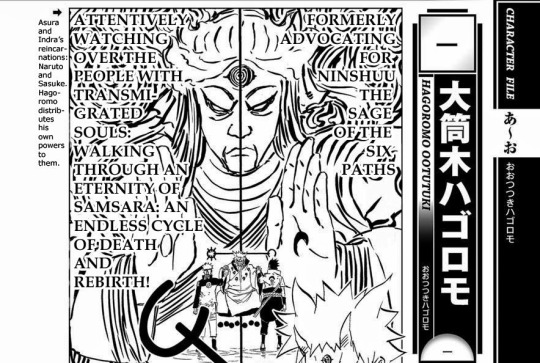
Saṃsāra is a Sanskrit word that means "world". It is also the concept of rebirth and "cyclicality of all life, matter, existence", a fundamental belief of most Indian religions. In short, it is the cycle of death and rebirth. Saṃsāra is sometimes referred to with terms or phrases such as transmigration, karmic cycle, reincarnation, and "cycle of aimless drifting, wandering or mundane existence"

You accepted that Ashura has reincarnated inside of you, instead of accepted that Ashura has reincarnated as you…. This makes me think that Ashura is just clinging to Naruto and isn’t actually him… Cause when people reincarnate they reincarnate as someone or something else, not inside of them, that’s more like a possession…
So this statement right here ^ is thoroughly debunked.
The definition of reincarnation and possession is vastly different with how they function and honestly disproves your own point of them being different people, because in order to be possessed you have to be CONTROLED by another entity which Naruto and Sasuke are not.
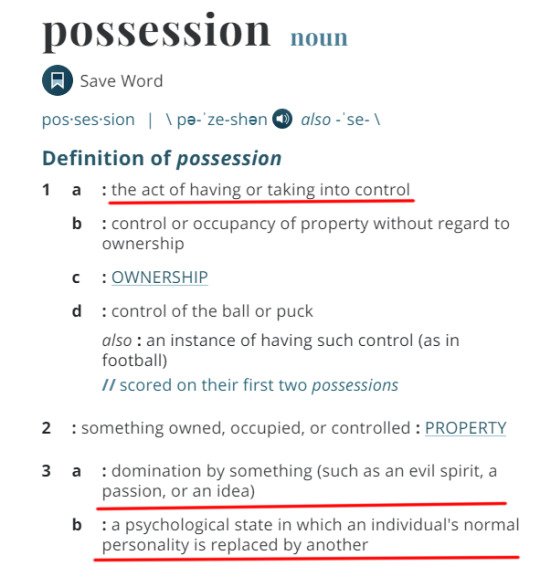
To possess is to take control over, if Indra and Ashura took control over them and have been in control their whole lives that means two twin brothers consciously developed romantic feelings for eachother by your logic, which is even worse than them just being reincarnations.
Possession is a term more accurate for Edo Tensei or Karma, not reincarnation.
So what am I getting at here? Reincarnation in Naruto doesnt mean being considered the same person as the deceased, it just means you have their soul, it DOES NOT MEAN Naruto is Ashura, he still has his own identity, but part of that identity is influenced by Ashura.
Hagoromo actually refers to it in several ways but they all essentially have the same meaning.
‘Ashura’s chakra is clinging about you’
‘Ashura’s presence inside you’
‘Ashura has reincarnated as you’
‘Ashura has reincarnated inside you’.
All different phrases, but carry the same meaning, Ashura’s soul reincarnated inside of Naruto, and Indra’s soul reincarnated inside Sasuke.
Your putting too much emphasis on the wording rather than the meaning.
Ashura clearly influenced Naruto in many ways despite them being separate people, by having the same soul its only natural that Naruto would inherit many of Ashura’s traits. Hagoromo himself points out how much like Ashura he is.
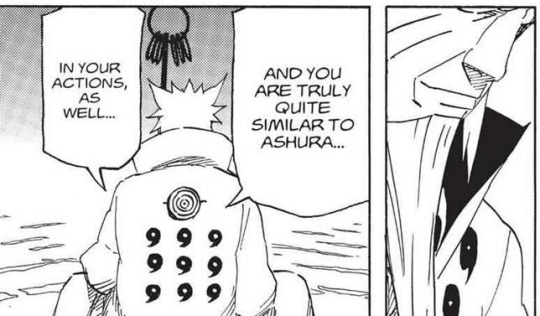
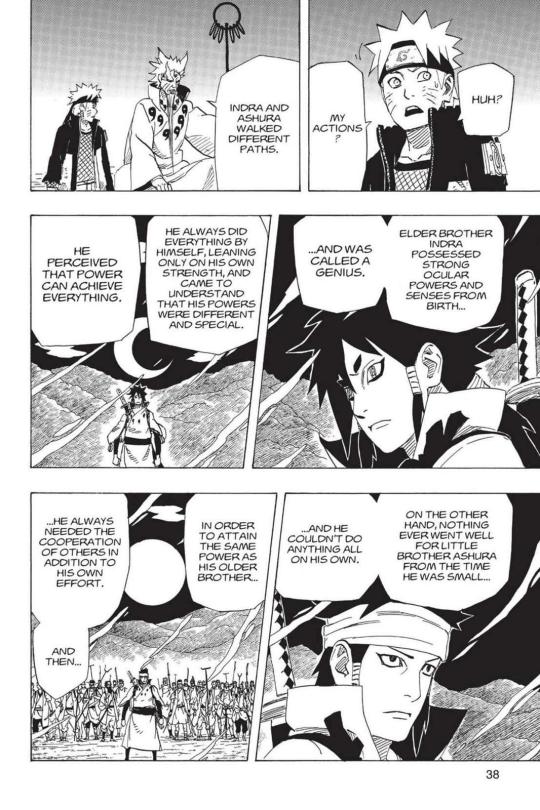
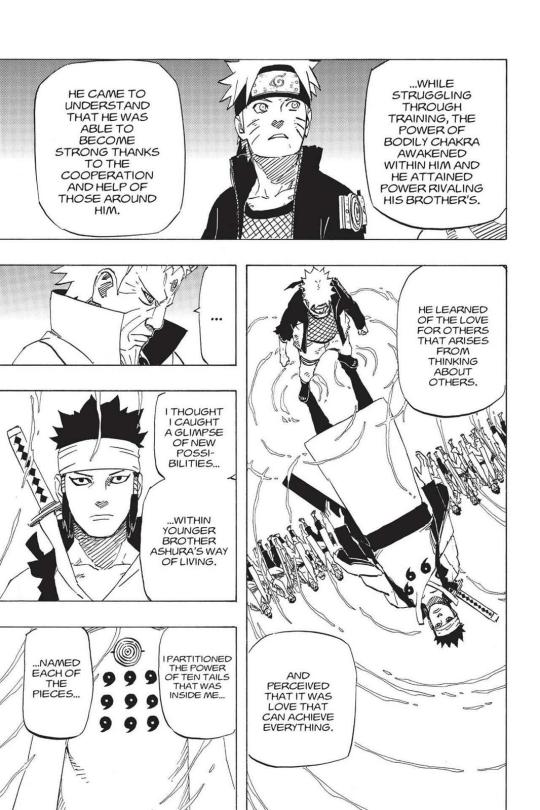
So their not really that different after all. Ashura’s soul still had alot of influence on Naruto’s beliefs, personality, and ideals as well as his strong bond with Sasuke. Naruto may have reached those conclusions in his own way through his own experiences but the result remained the same as Ashura’s due to his influence from inside him.
However although their not the same person physically, I think its important to note they are the same person spiritually. They still have their own unique chakra signatures that can be distinguished by certain ocular jutsu’s, but they are still overall the same spiritually with the same soul and chakra.
Naruto Uzumaki became the next inheritor of Asura's chakra and will, with Sasuke Uchiha inheriting Indra's chakra and will.
Again this is from the wiki, but it still accurately depicts what happened. They are different people, but they still inherited Indra and Ashura’s will from having their souls inside them.
Dont misunderstand, Naruto and Sasuke still have their own wills too and not all of their decisions and feelings extend from Indra and Ashura, Im just saying that they had an INFLUENCE on them in several aspects of their lives, but they still formed their own bonds and relationships through their own life experiences. Zetsu even comments on how Naruto and Sasuke are cooperating closely together more than any other reincarnate before them, proving they are still their own person capable of doing things their own way.
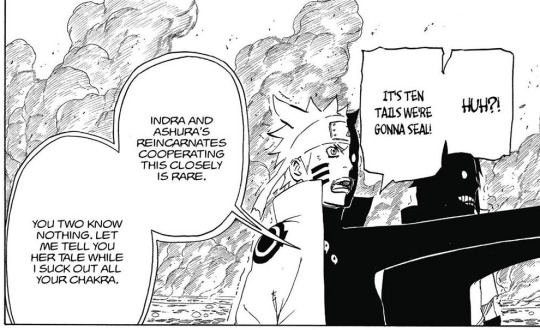
The fact that Naruto was able to succeed where Hashirama and Ashura failed is also proof of their individuality, but that was also predestined to happen.
Ultimately, Naruto managed to succeed in Asura's final goal which all other reincarnations failed at: end the rift between the two lines of the reincarnated brothers. Naruto achieved this after defeating Sasuke, who then finally accepted Naruto's ideals.
Everything I said for Naruto applies to Sasuke so I dont really need to reiterate it.
Onto the next point.
My point is that Indra and Ashura clung to people of their bloodline that was a lot like them, in terms of personality or ambitions, and thereby were reincarnated… So Naruto and Sasuke aren’t brothers and instead are just possessed by brothers..
This is impossible, because Indra and Ashura didnt possess Naruto and Sasuke like I said, but reincarnated inside them not long after they were born once both previous reincarnates were dead, meaning Indra and Ashura had NO idea what Naruto and Sasuke’s personalities or ambitions would be later in life. Their not psychic, they cant see the future so this argument is invalid.
They simply reincarnated inside Naruto and Sasuke because they were newborns and Hashirama was already dead, so all that was needed was for Madara to die which didnt happen till years later when Naruto and Sasuke were born. Once Sasuke was born Indra reincarnated into him, and when Naruto was born Ashura reincarnated into him. Naruto and Sasuke just happened to be born at the right time, there was nothing more to it than that.
So now that we’re done with the reincarnation counter argument, now for why NaruSasu is problematic because of it and yes, they are in fact brothers.
For starters going off what I said about reincarnation alone already makes things problematic, infact it is the MAIN reason its problematic. Just because Naruto and Sasuke arent literally Indra and Ashura doesnt change the fact that they have their SOULS, meaning they are literally SOUL brothers, do you really not see the problem with two guys who were TWIN brothers in their past lives to be romantically involved? come on now.

Here he says that he and Sasuke aren’t true brothers, which means that they’re not actually related despite being reincarnated from brothers.. Which again, to my knowledge, if you’re reincarnated from brothers you’d still be brothers… But he says that they’re not…
This is flawed on so many levels, as I’ve already explained how reincarnation works in both Naruto and Japanese beliefs they are SOUL brothers. If your soul was reincarnated into a new body, and your brother or sisters soul was reincarnated into another body, would you want your reincarnates in a romantic relationship with eachother? I know I wouldnt, because as shown in Naruto Indra and Ashura are still very much conscious inside them, which means they are AWARE of whats happening, they just dont have control over them.
Even if they WERENT conscious its irrelevant, because the core issue is that they are THERE and they are BROTHERS, this is not incest in a physical sense, but in a spiritual sense this is very much an incetuous ship as they share both body and soul, that is still VERY problematic because they are STILL brothers, not by blood, but by soul.
While Naruto does say that he sees Sasuke as a brother several times, it doesn’t seem like that at all… To me it seems more like a crush that he doesn’t realize he has, or a crush he isn’t ready to believe he has…
Thats all speculation and how you choose to perceive things, but there is beyond enough evidence that proves it wrong which I’ll go more in depth in another post I’ll link back to here. But honestly theres not only tons of evidence that proves it wrong, theres literally nothing anywhere in canon that suggests romantic feelings between them in the first place. Thats a fact not an opinion.
Want my more condensed version of why NaruSasu are brothers refer to my twitter thread here
But just to add one of my points here, which is the other biggest reason NaruSasu is problematic, is that they are ACTUAL brothers.
I know right? I just said their not Indra and Ashura and are their own person how are they brothers? simple, thats true only for the show, however theres one other key factor that makes any argument you try to pull from the show for WHY their not brothers null and void. Which is that they are brothers by DESIGN.


Unfortunately the link is no longer available but this persons summary is pretty much what Kishimoto said. And the one above it is an actual sceenshot from when the site was still up.
From the beginning they were modeled after two real life brothers, Kishimoto and his twin brother Seishi, that was always the INTENT when making Naruto and Sasuke’s bond, so regardless of if their brothers by blood, by soul, or by bond, they are brothers by design, theres not a single argument you can come up with that’ll change that.
So in conclusion, yes, Sasuke and Naruto are real brothers by design, so for some people to call it incest is not far from the truth, because to ship Naruto and Sasuke your essentially shipping Kishimoto and his Twin brother.
I didnt wanna make this too long, so I focused on just the reincarnation aspect as that was the main point of the argument, and saved the other stuff about their relationship for another post so there wouldnt have to be a ton of scrolling on one post. But honestly? I think this post sums it up pretty well on WHY shipping this is problematic, you dont HAVE to stop shipping it if you dont want to, Im just pointing out why saying they are not brothers is factually incorrect.
20 notes
·
View notes